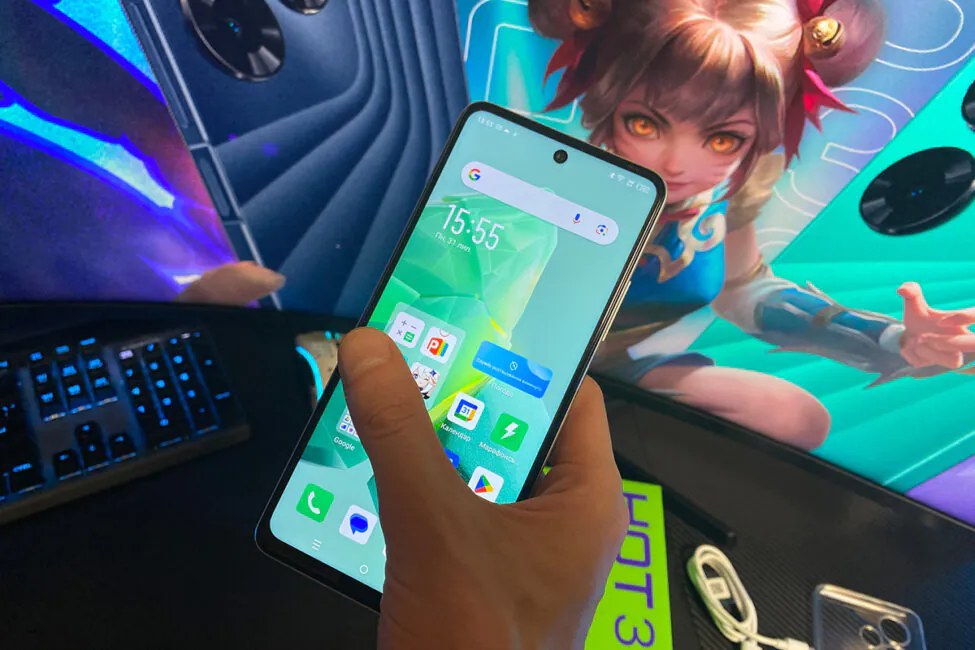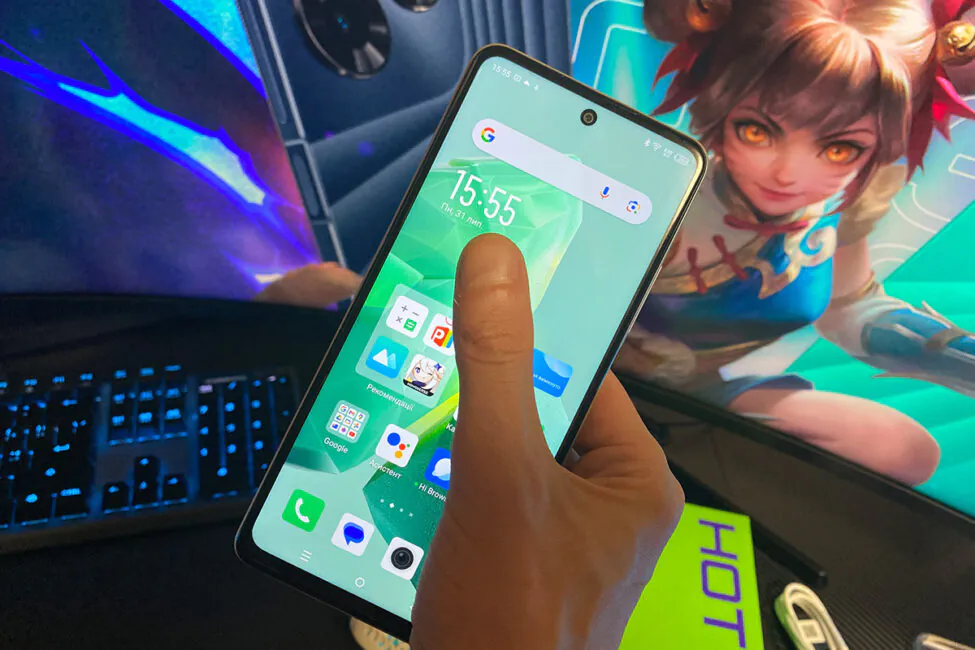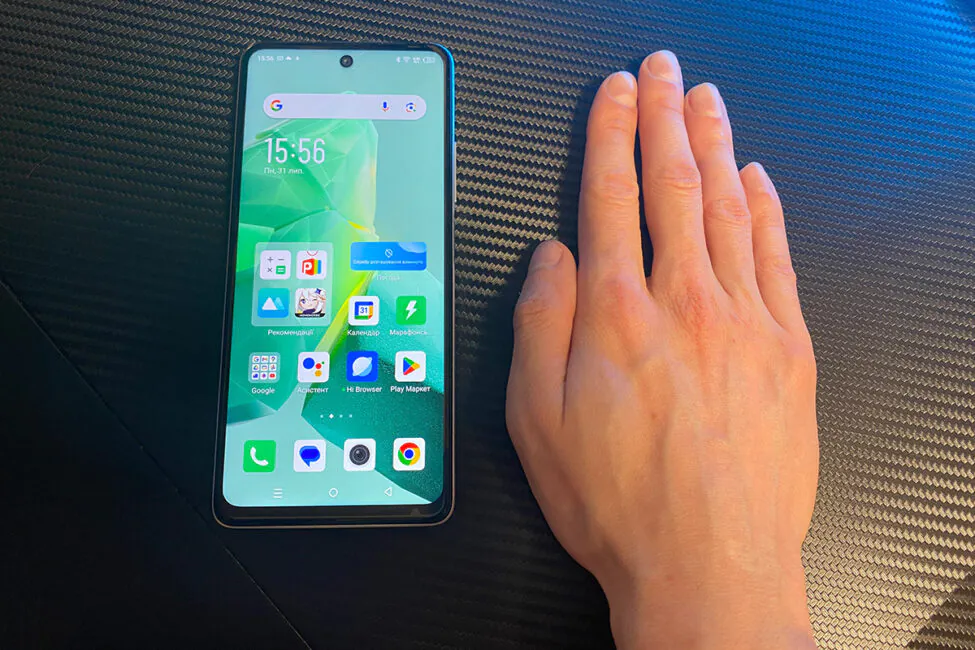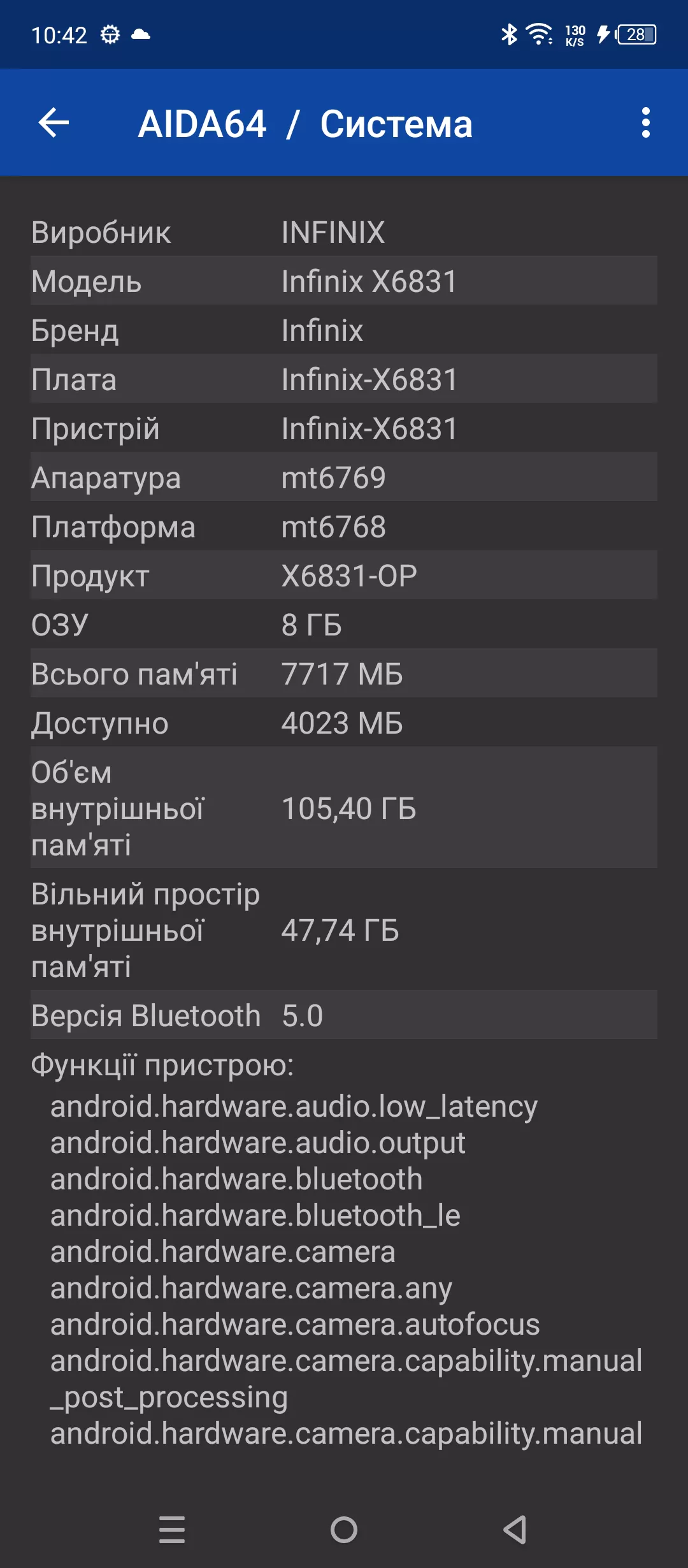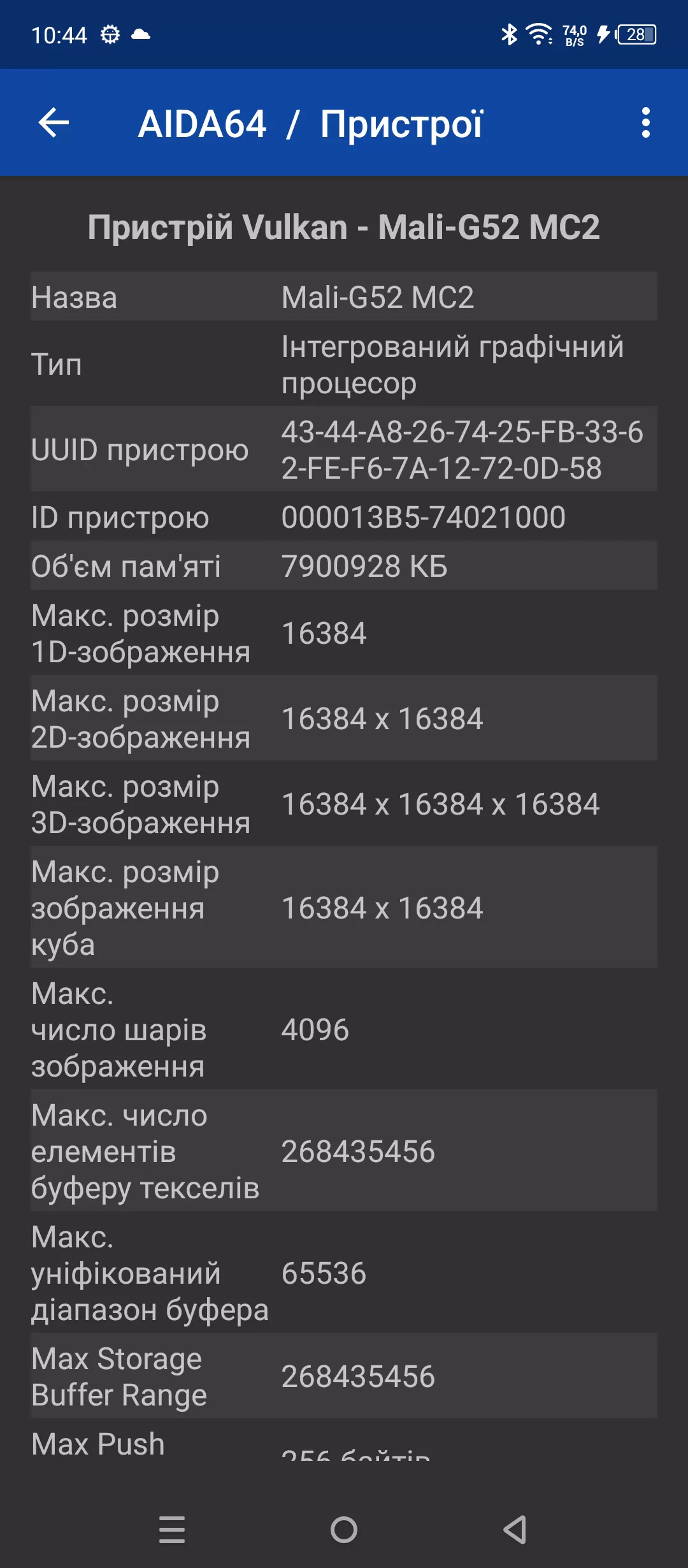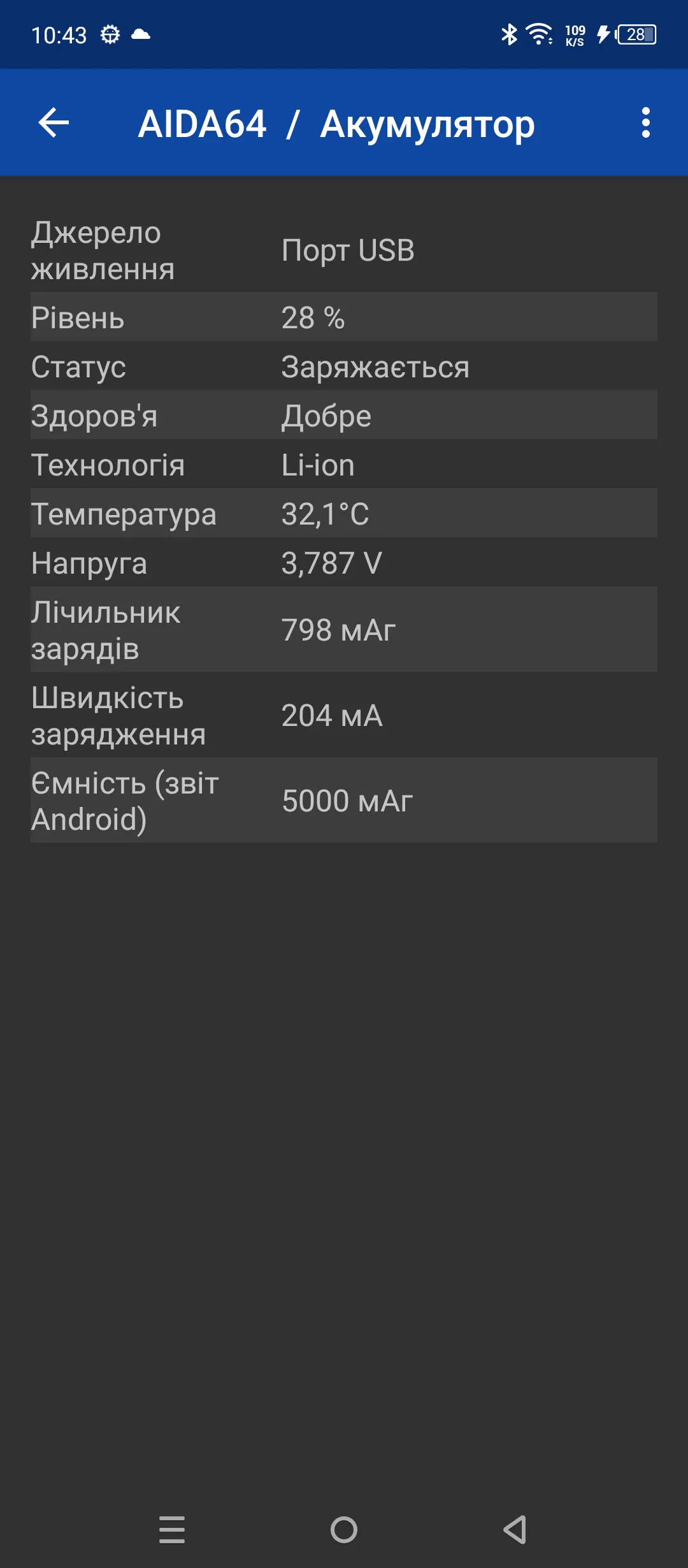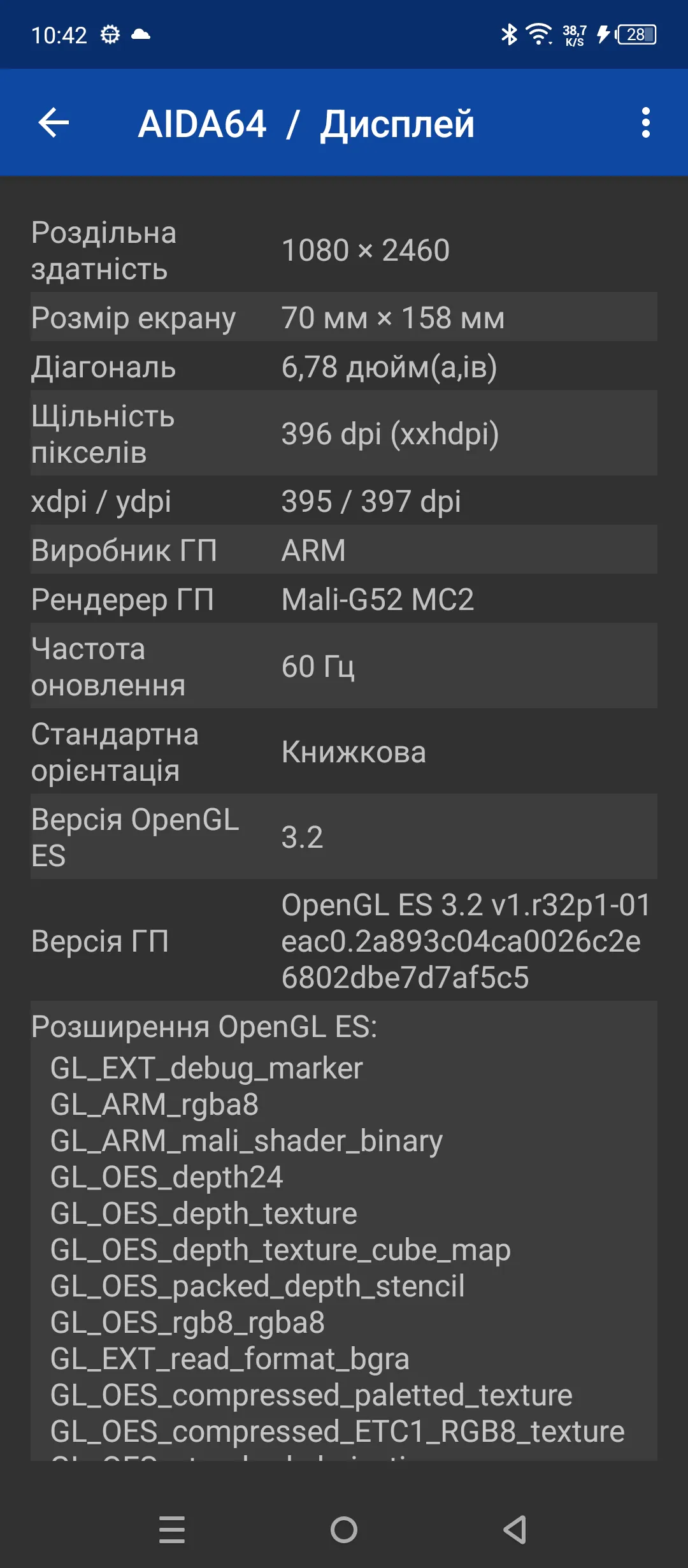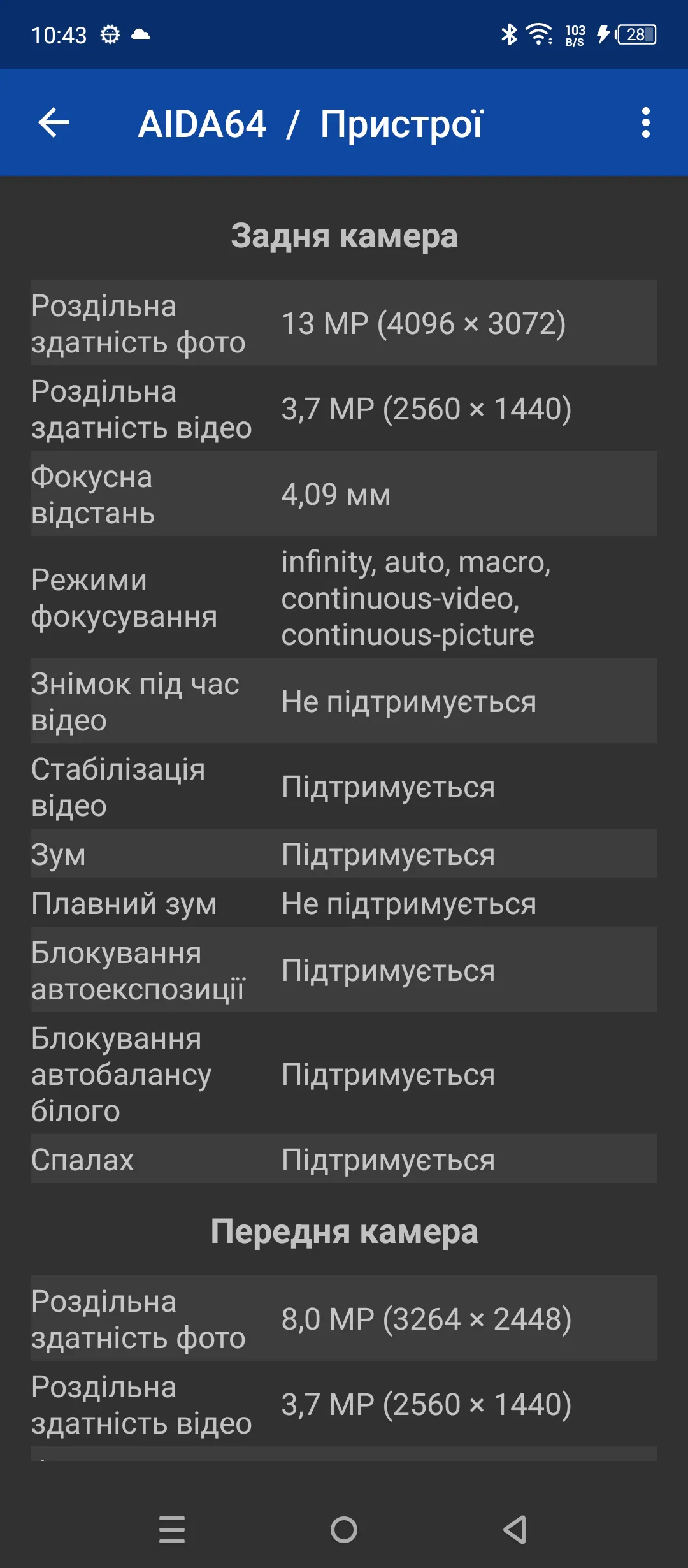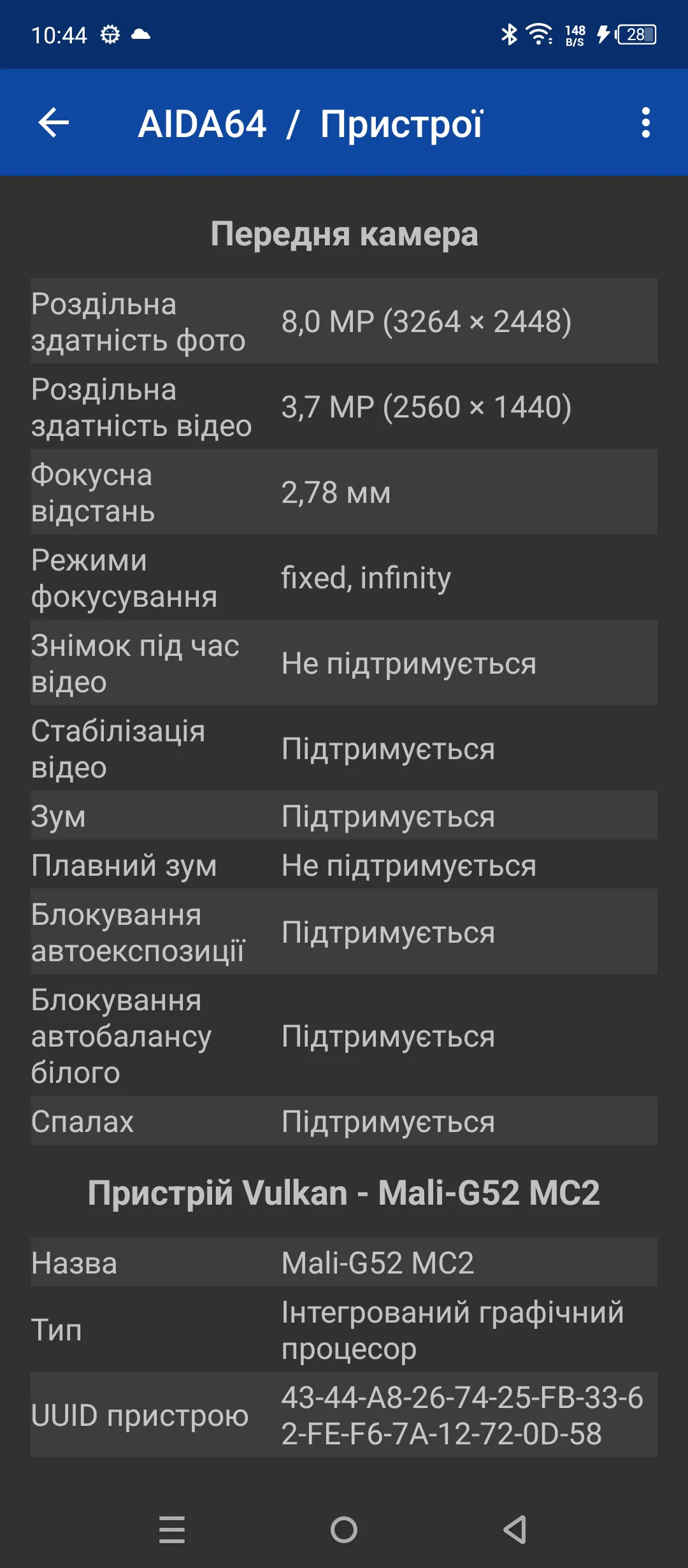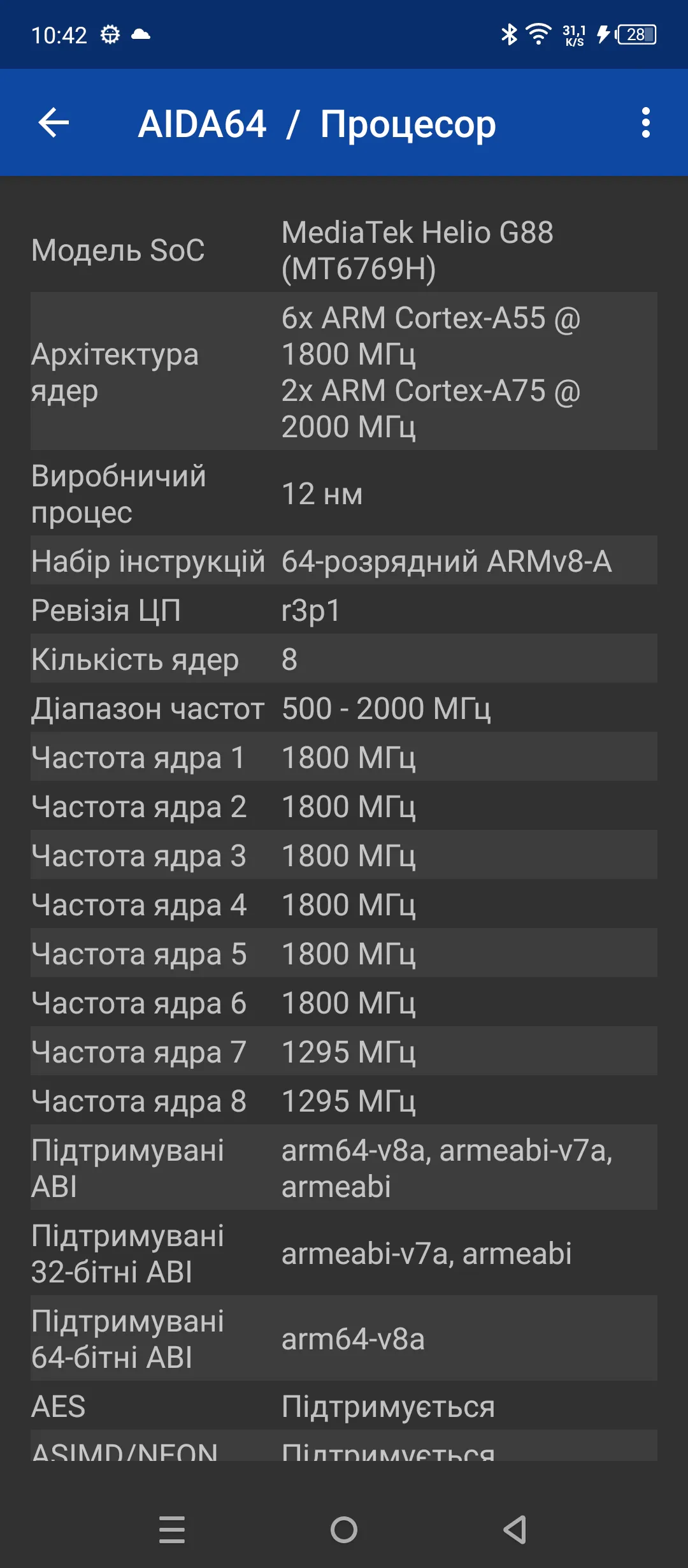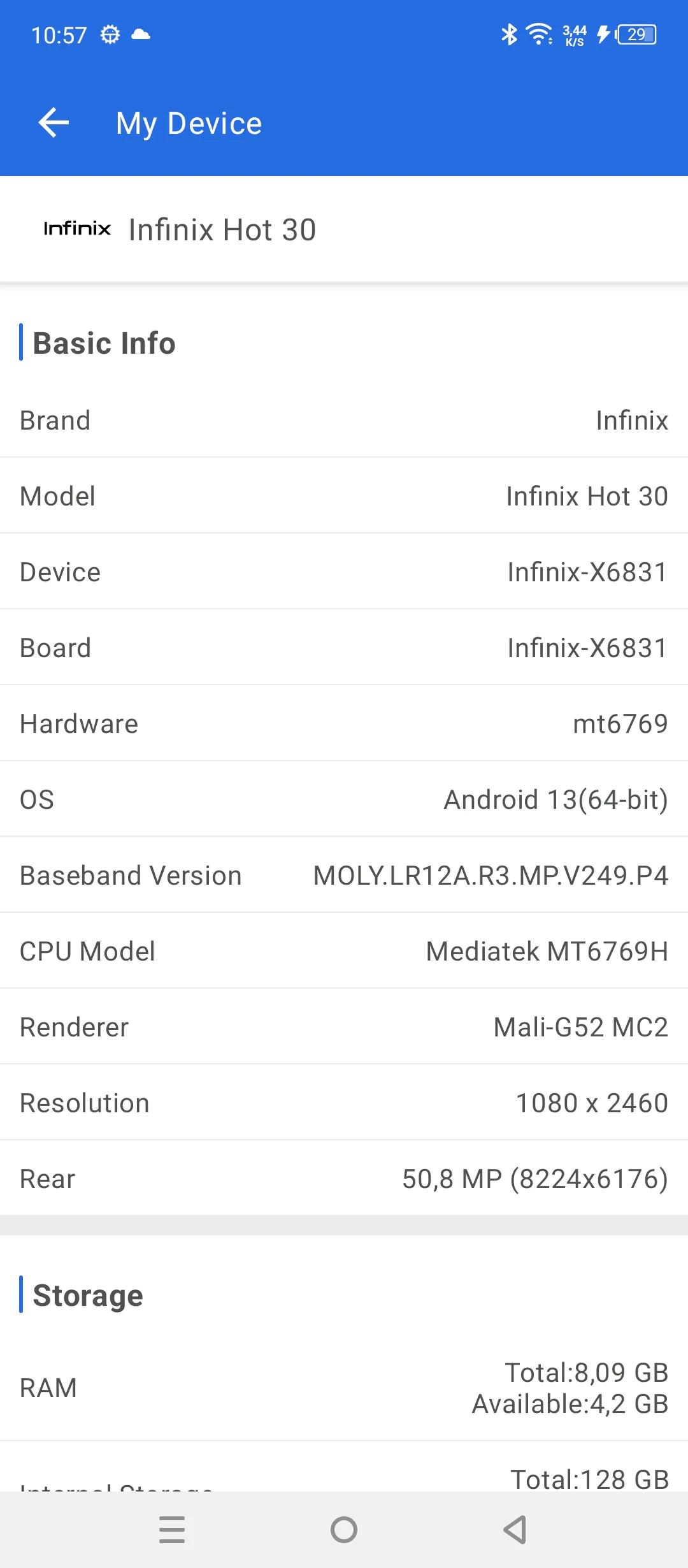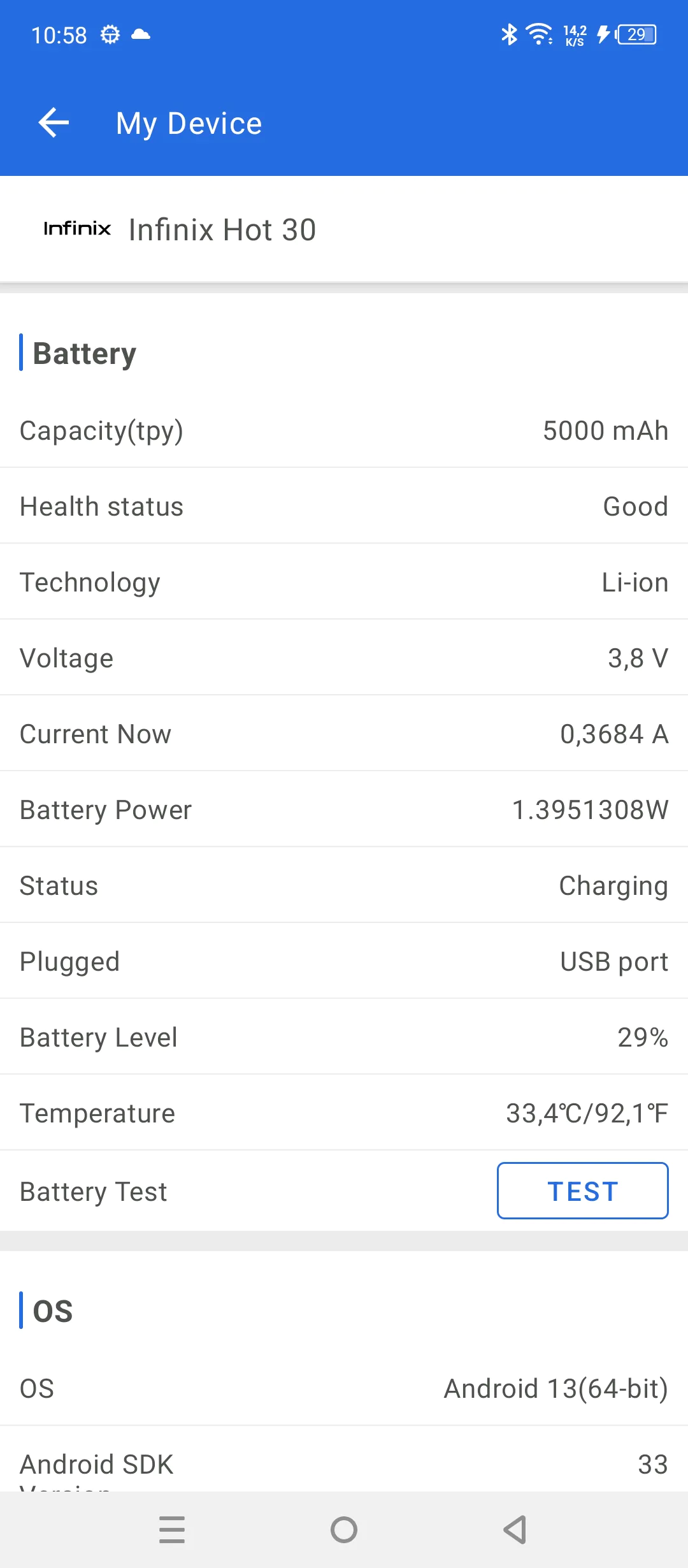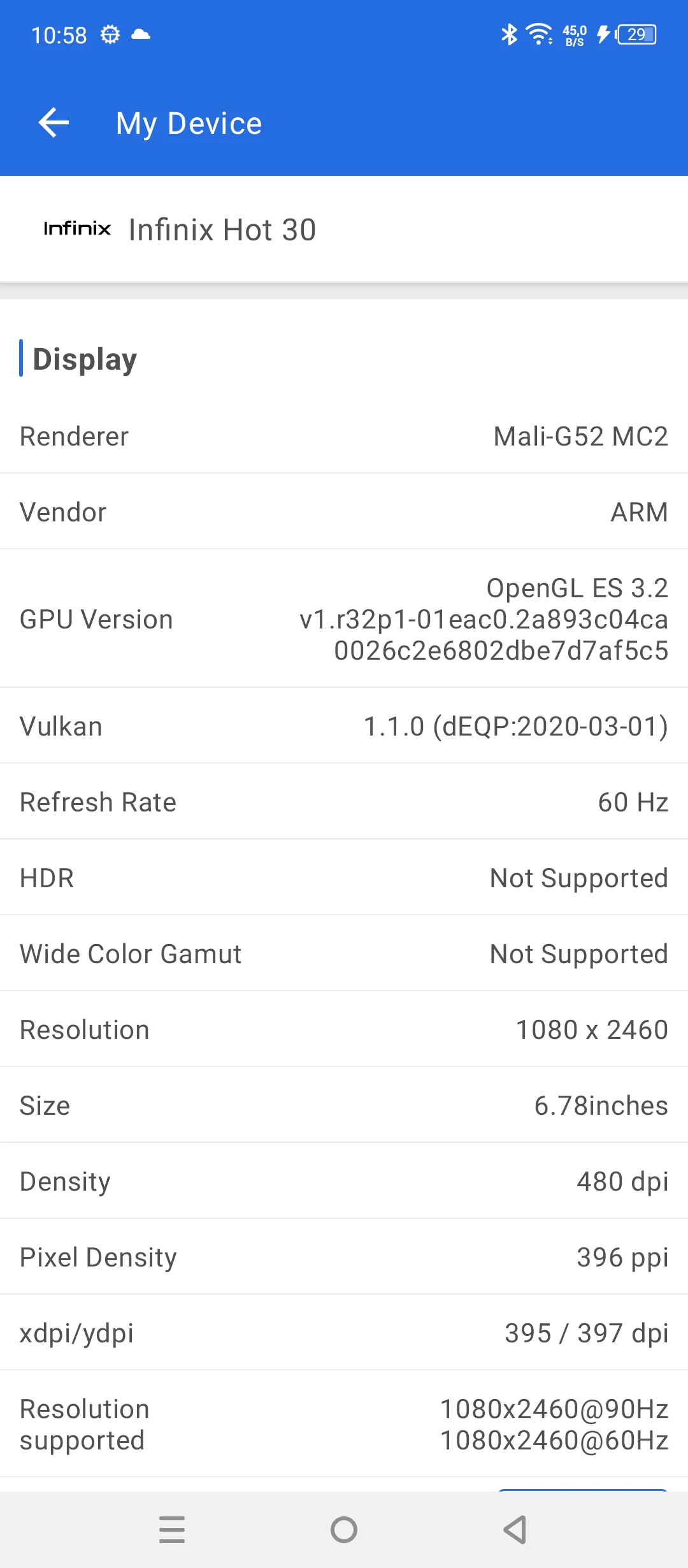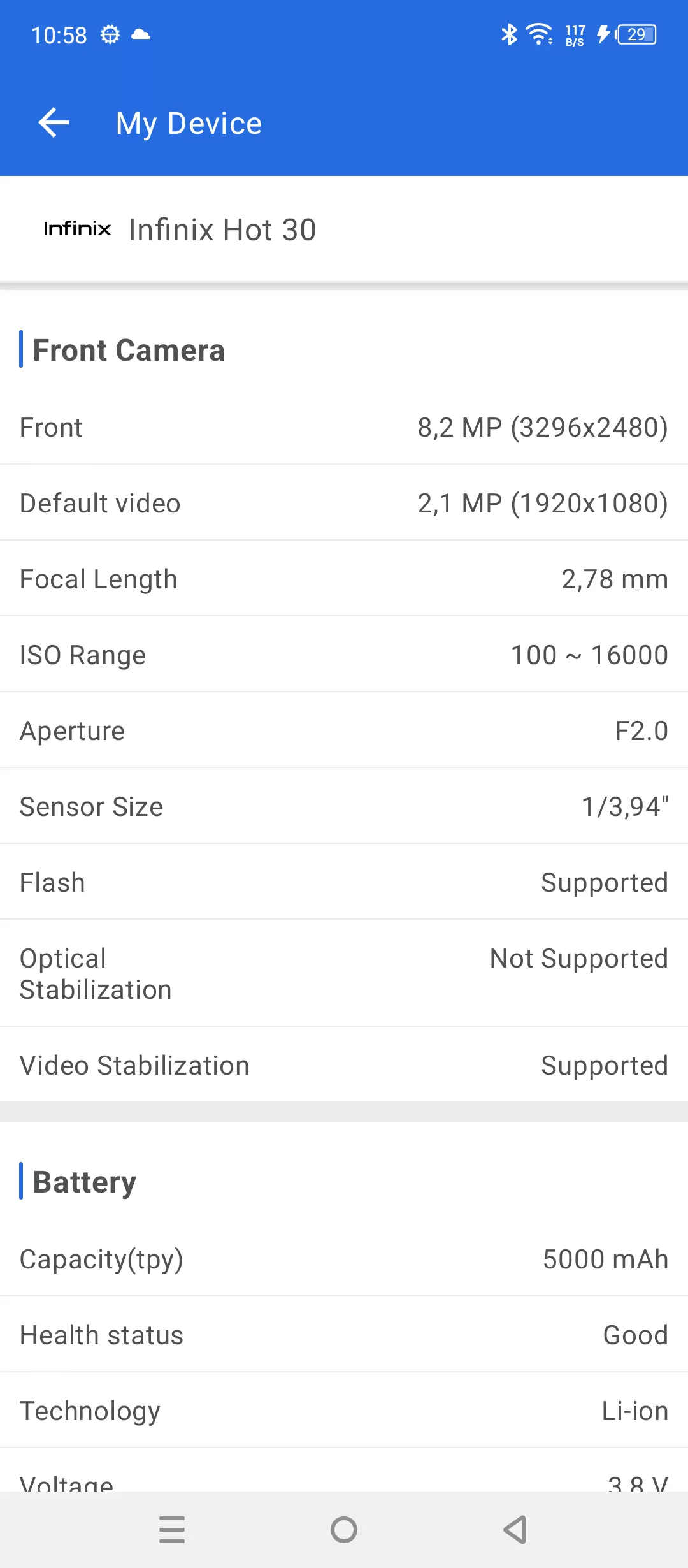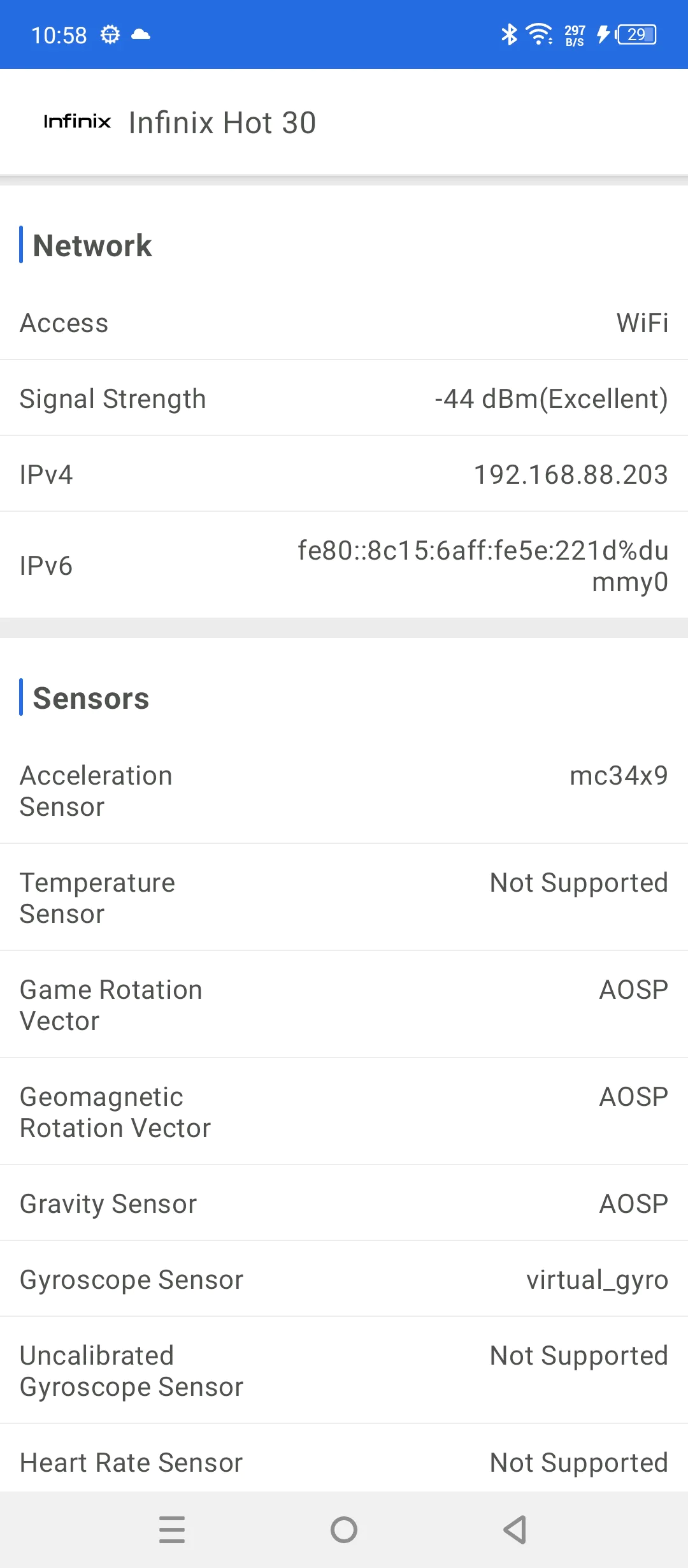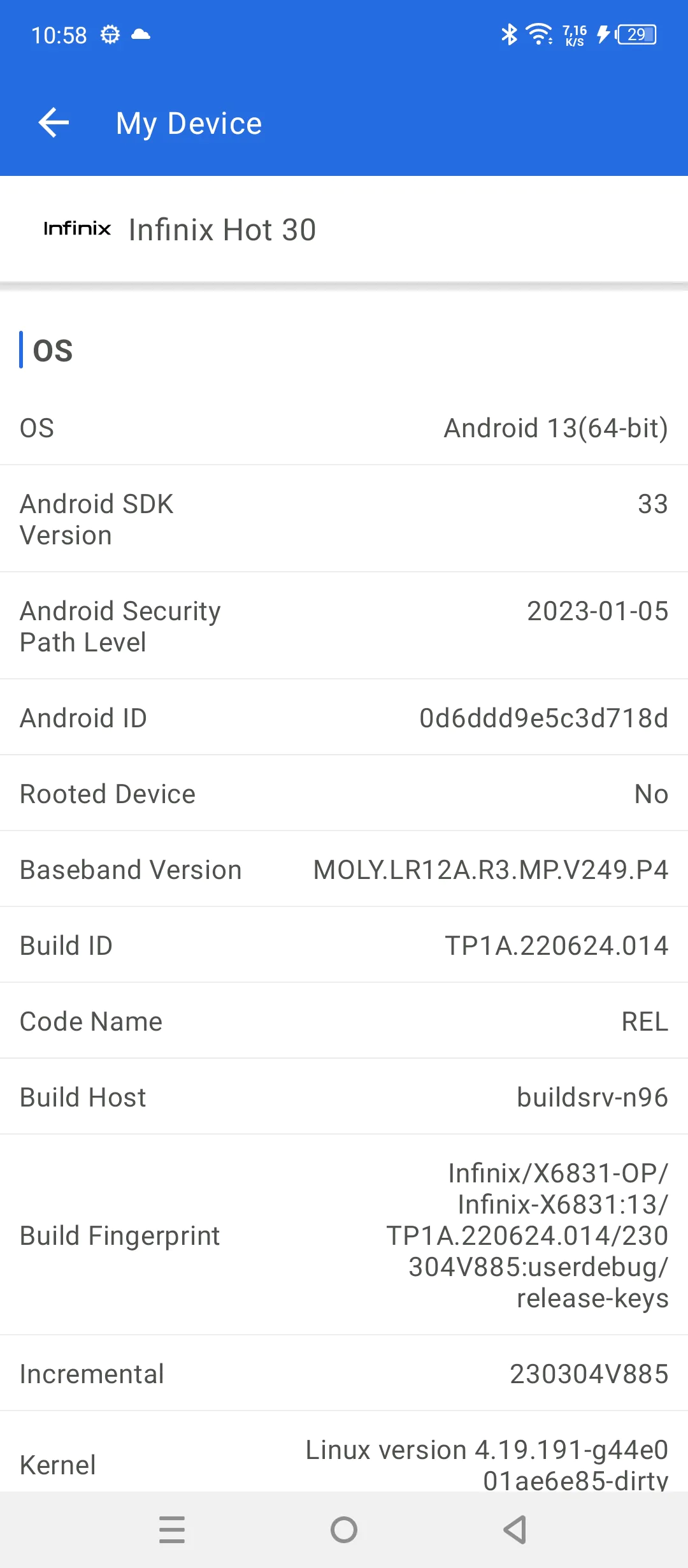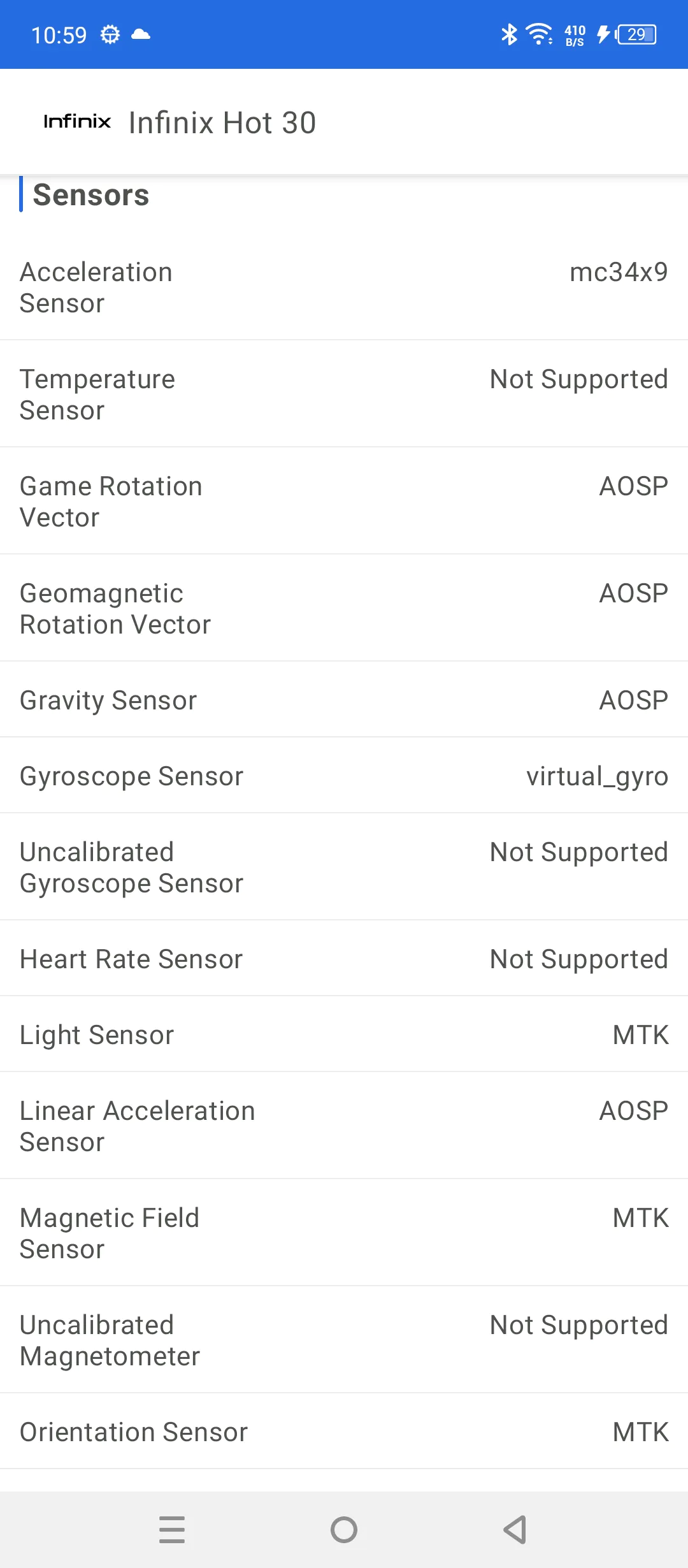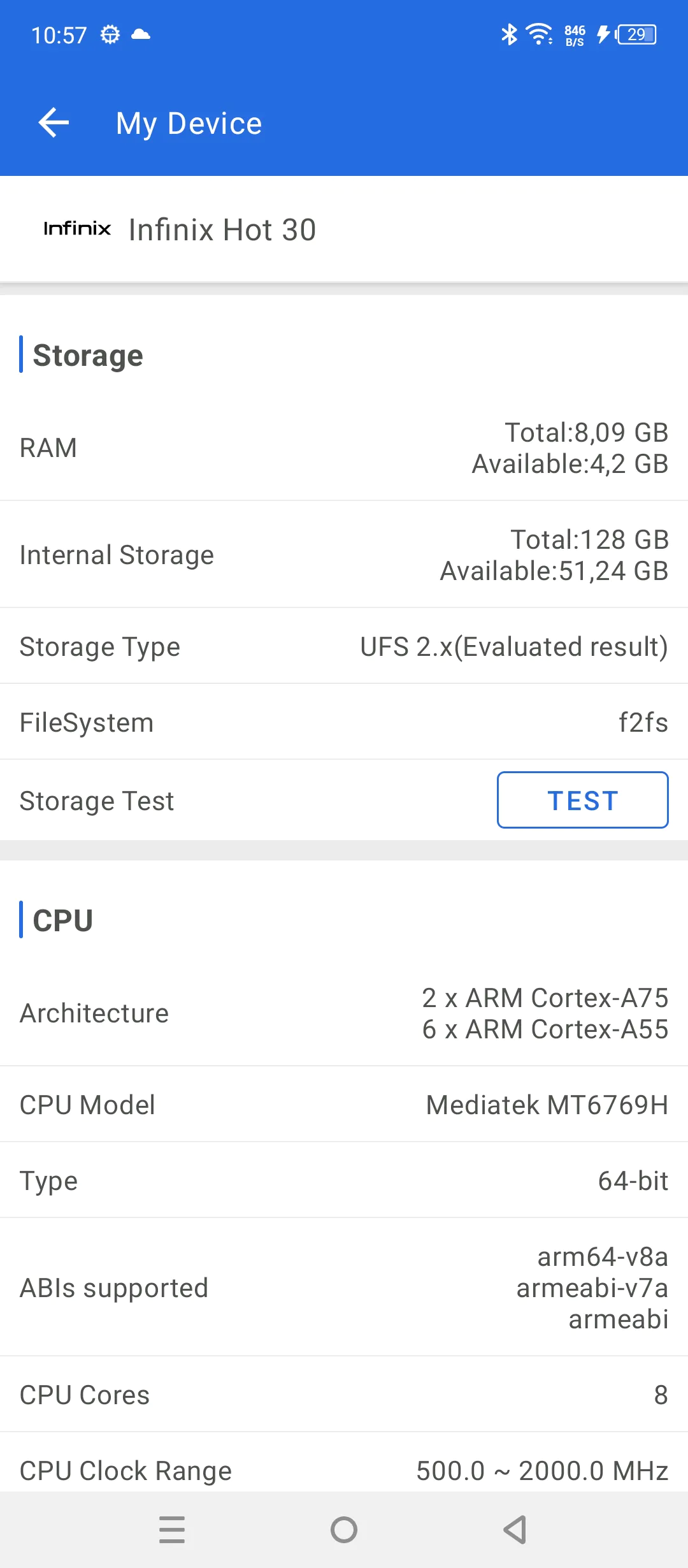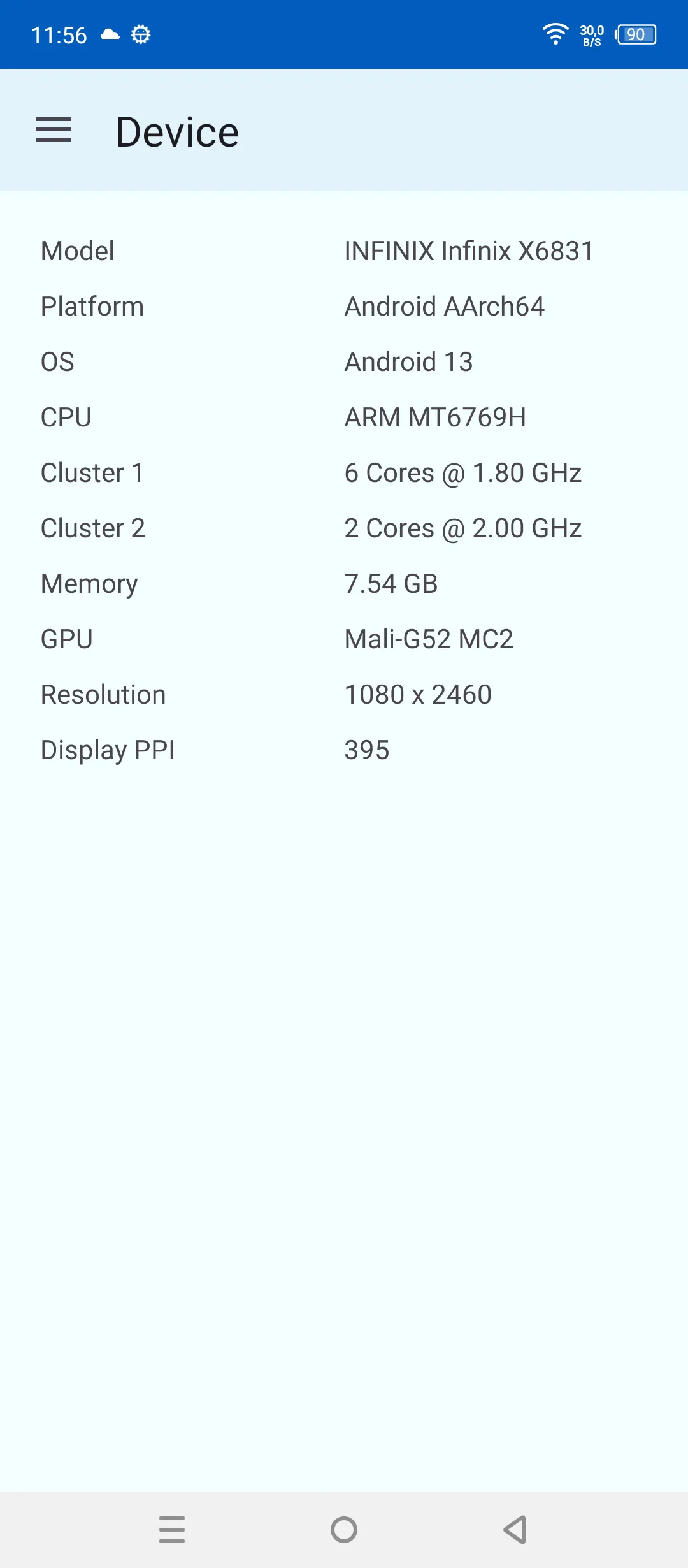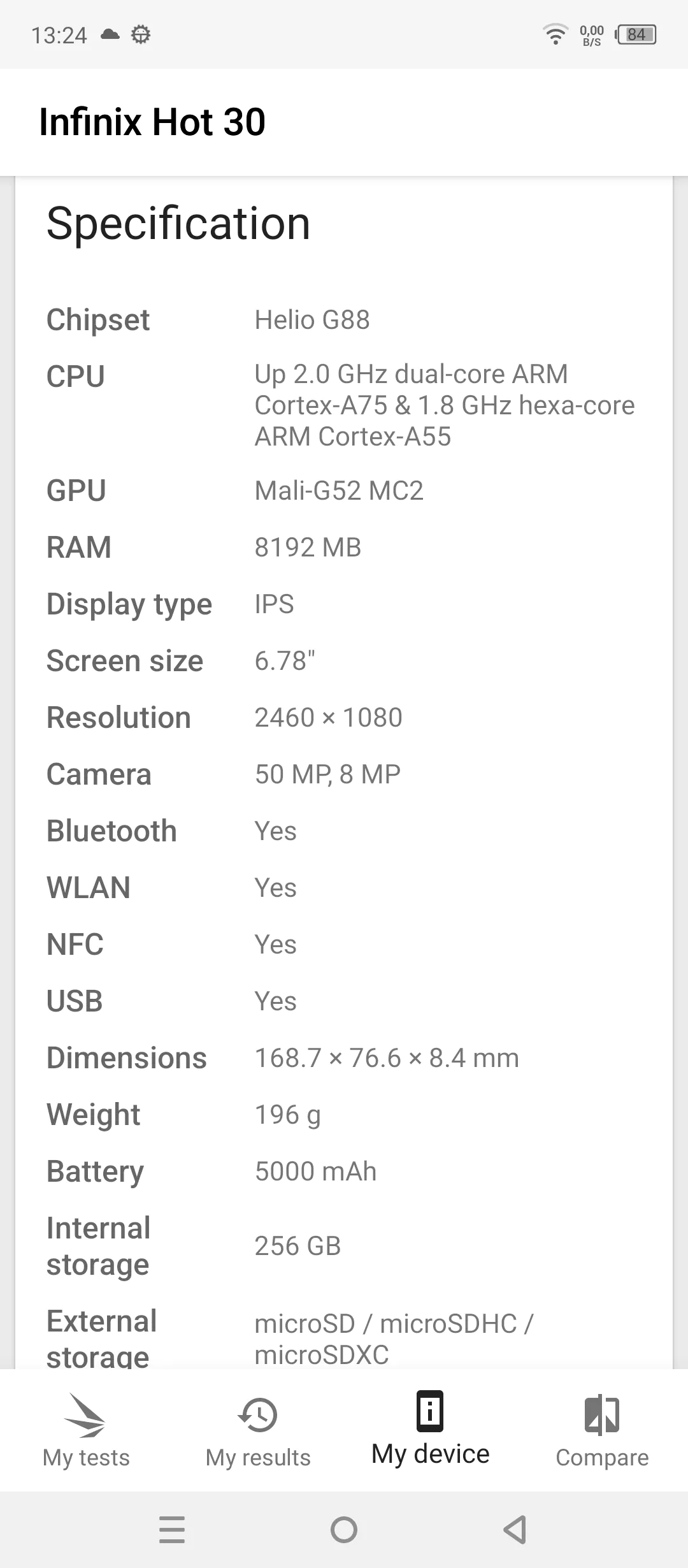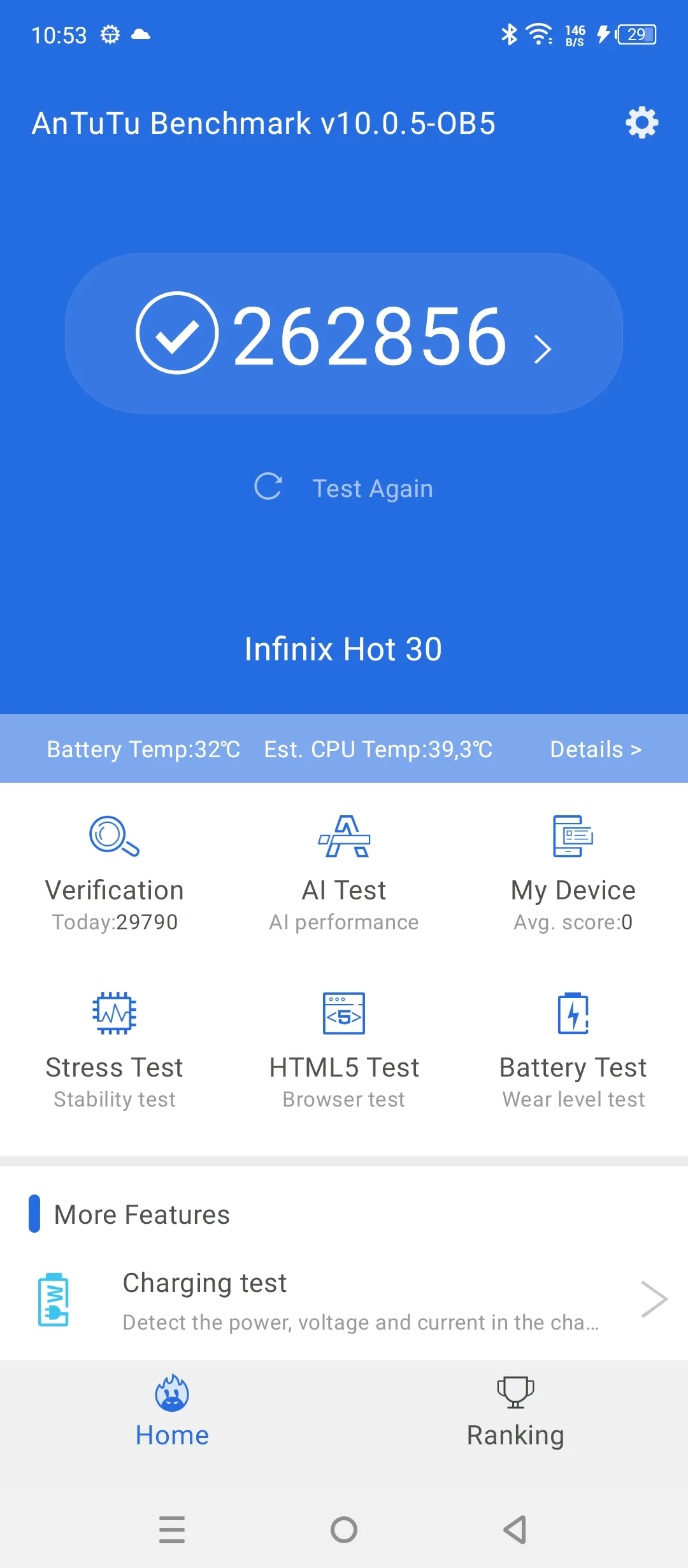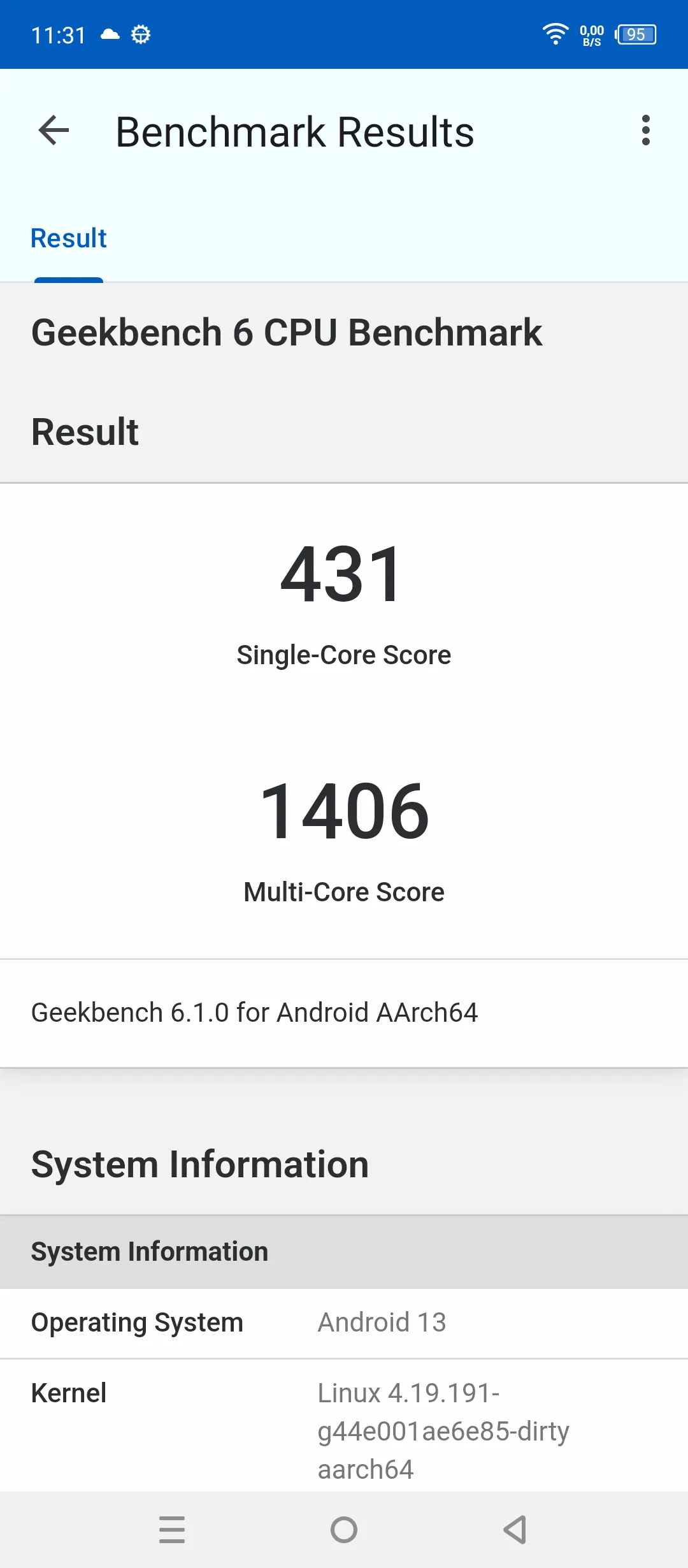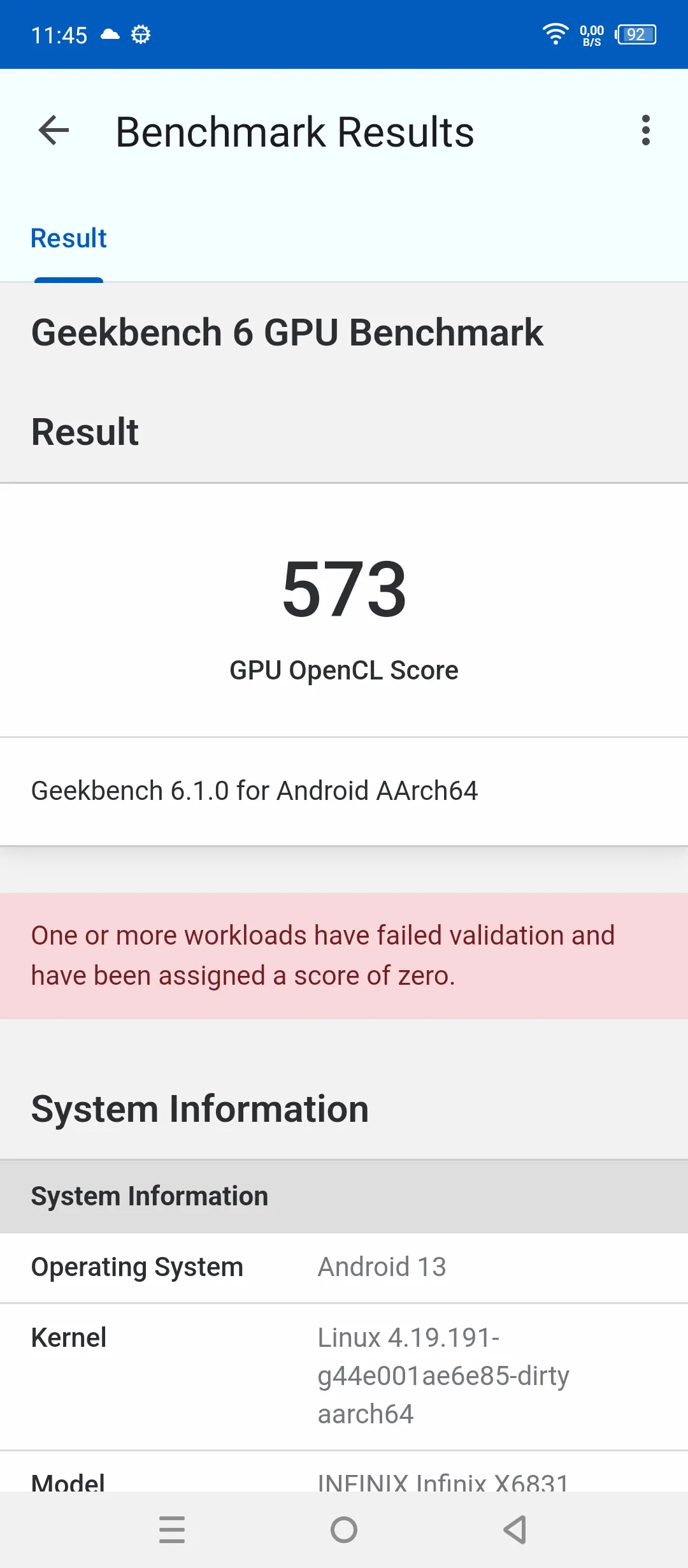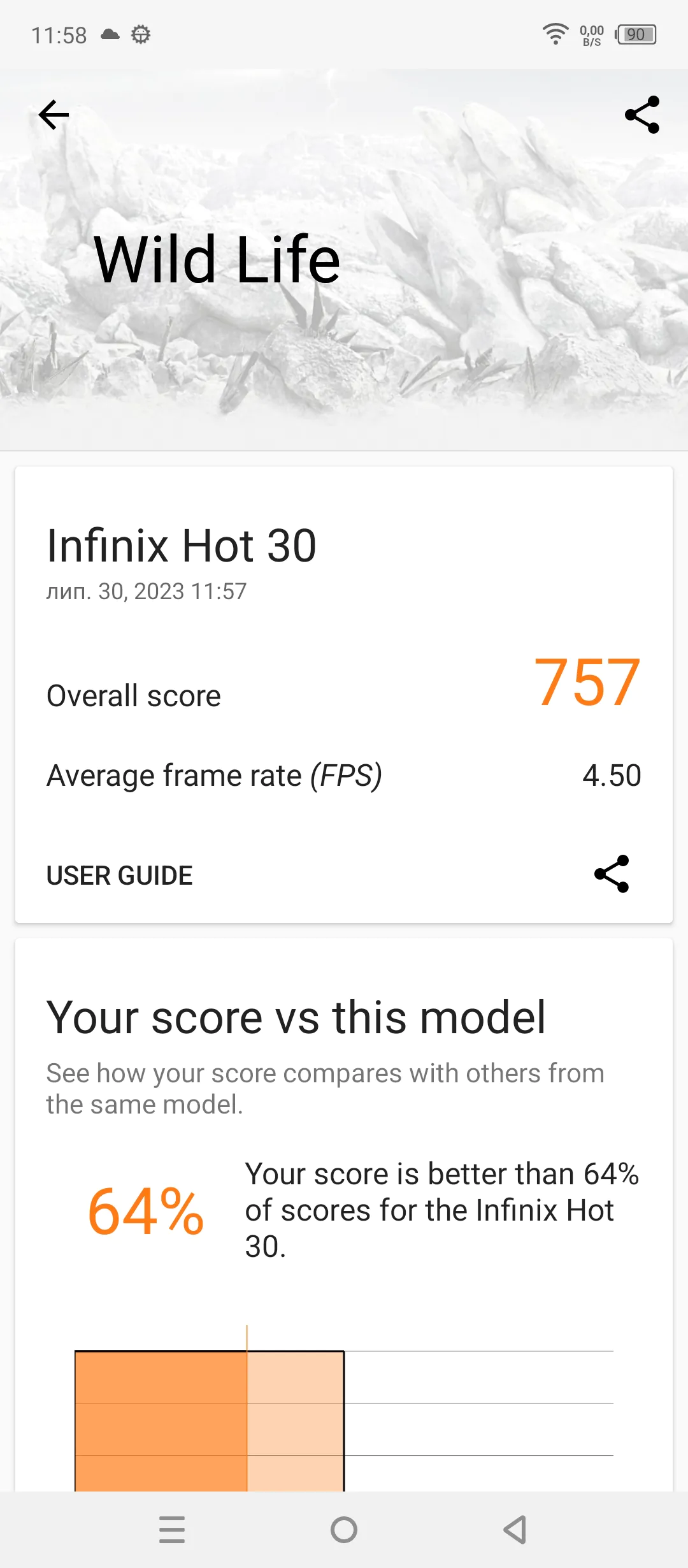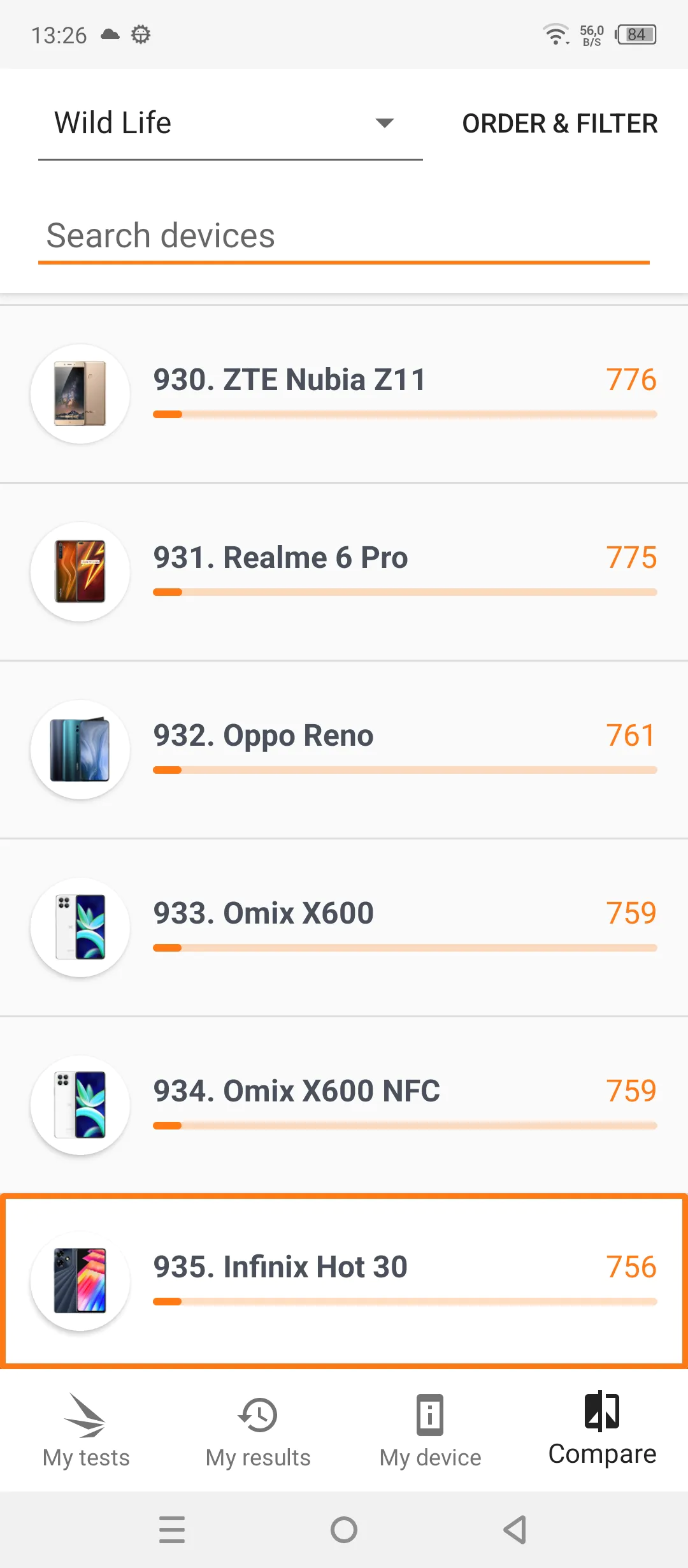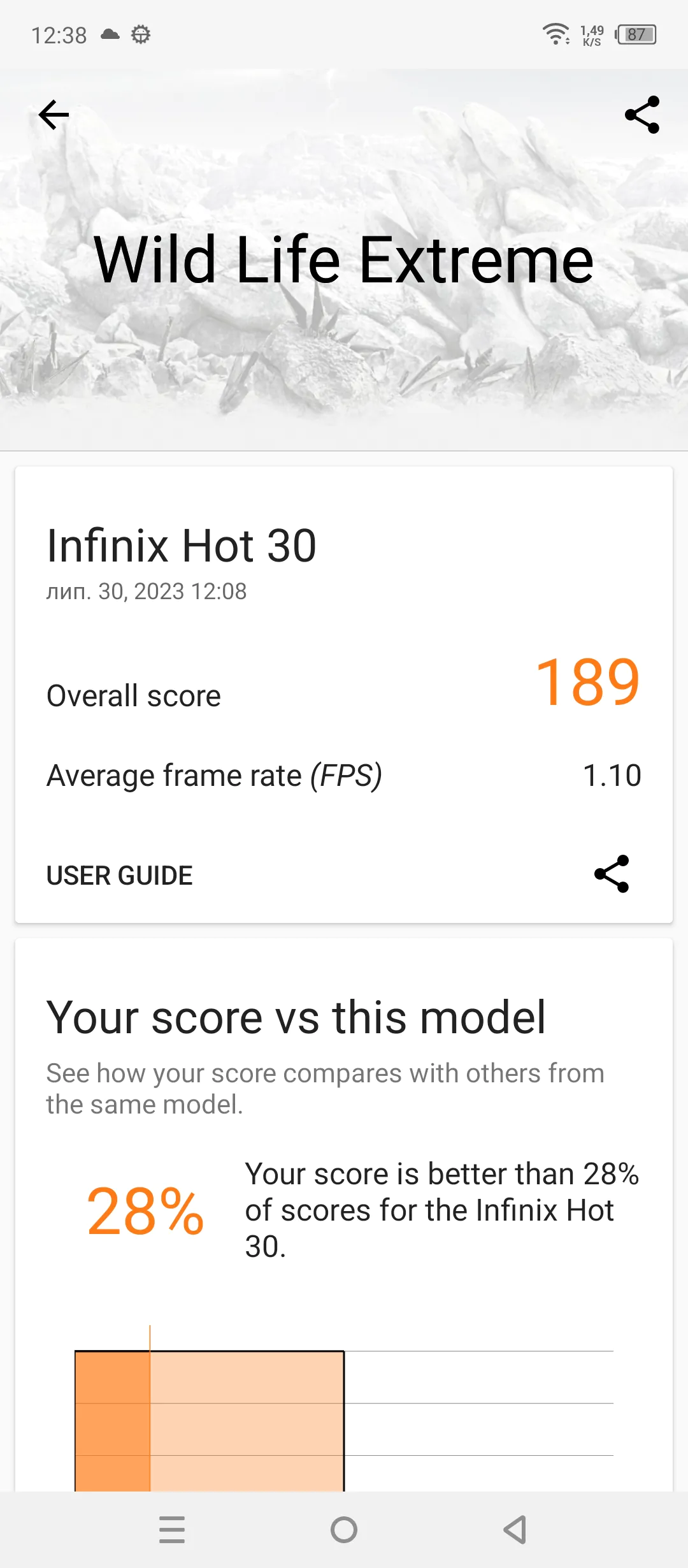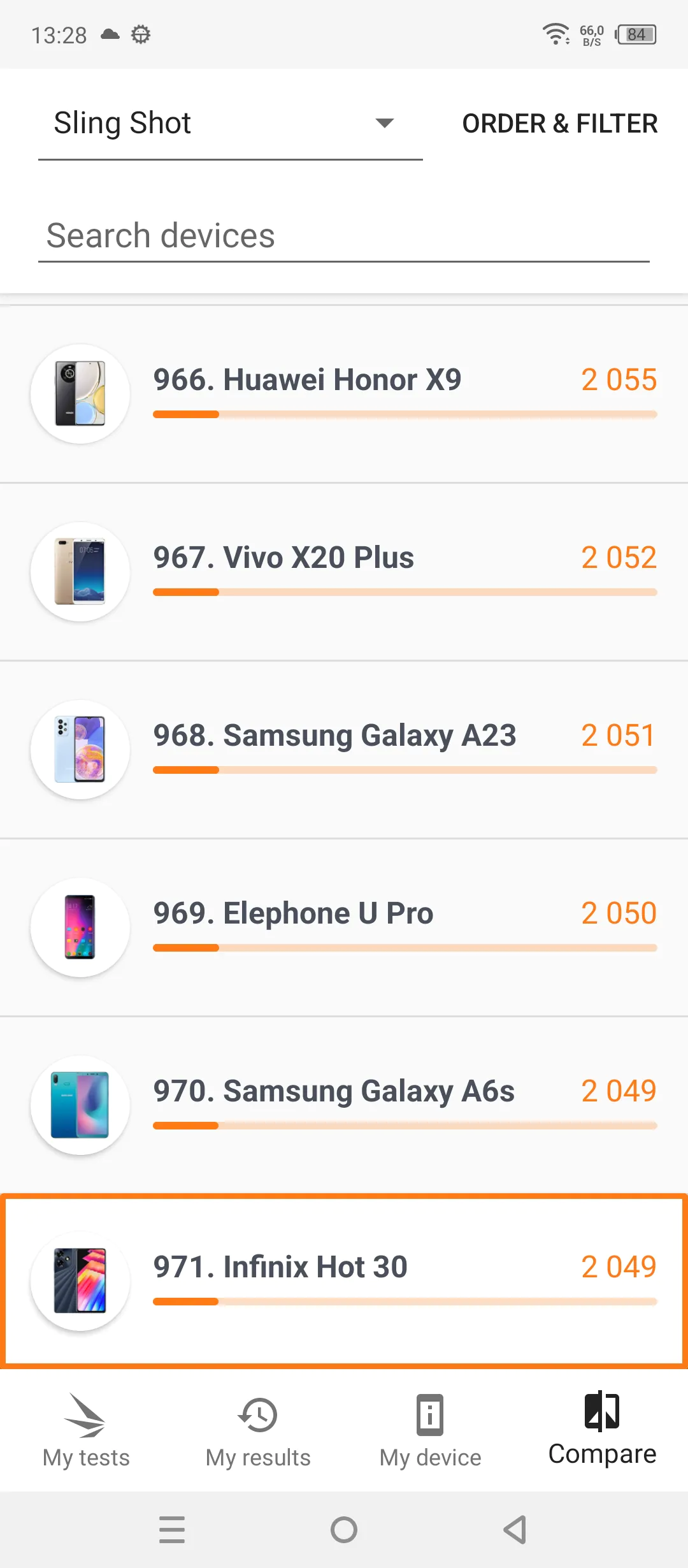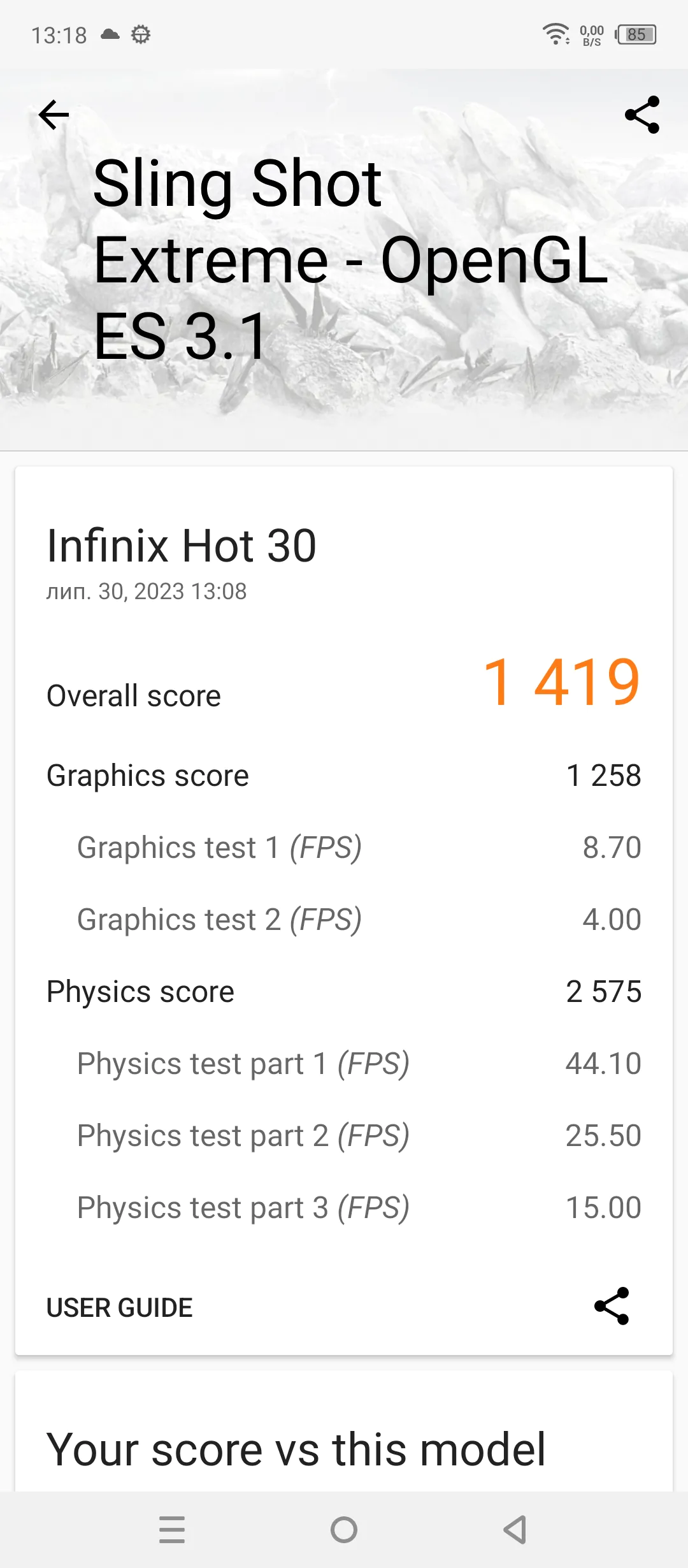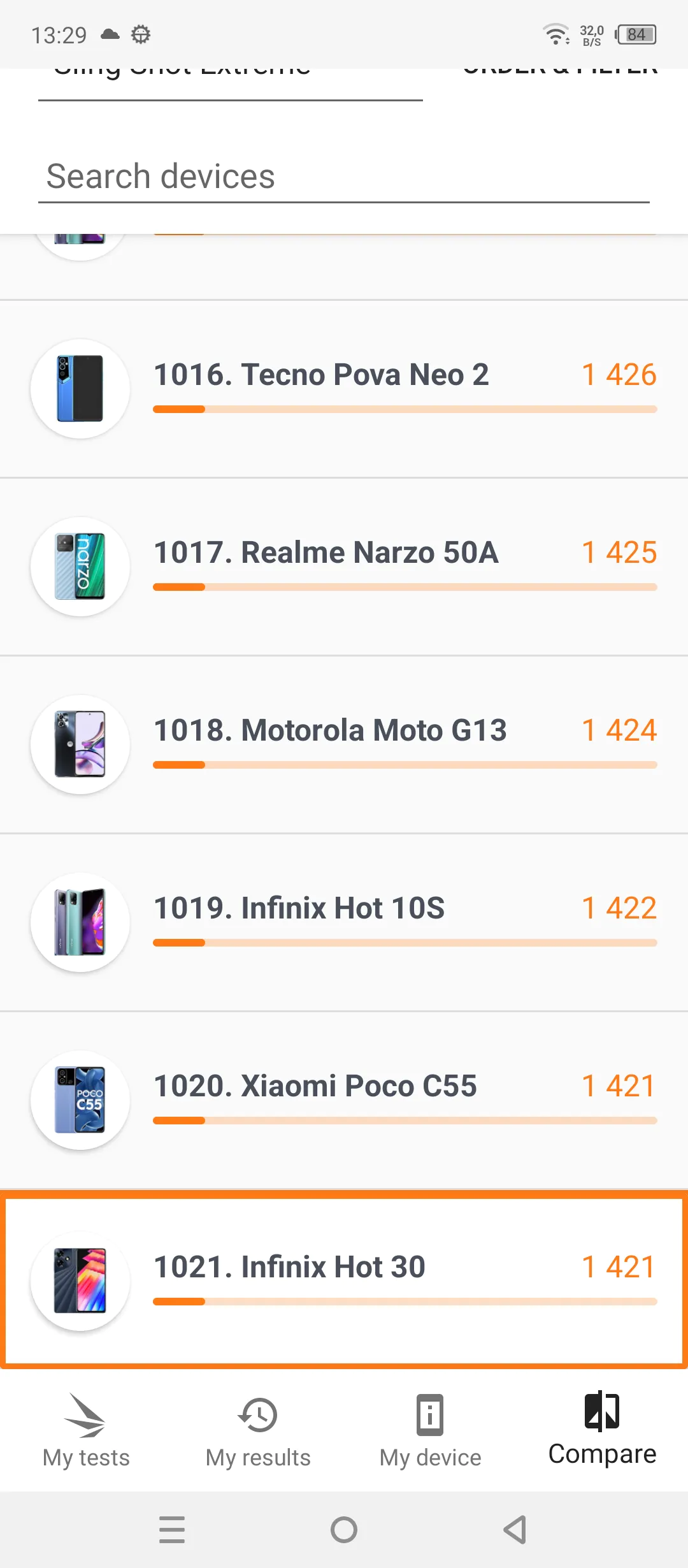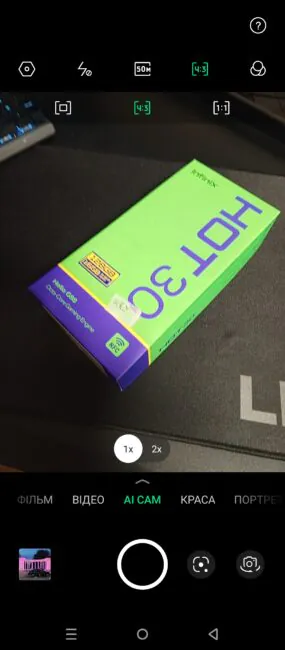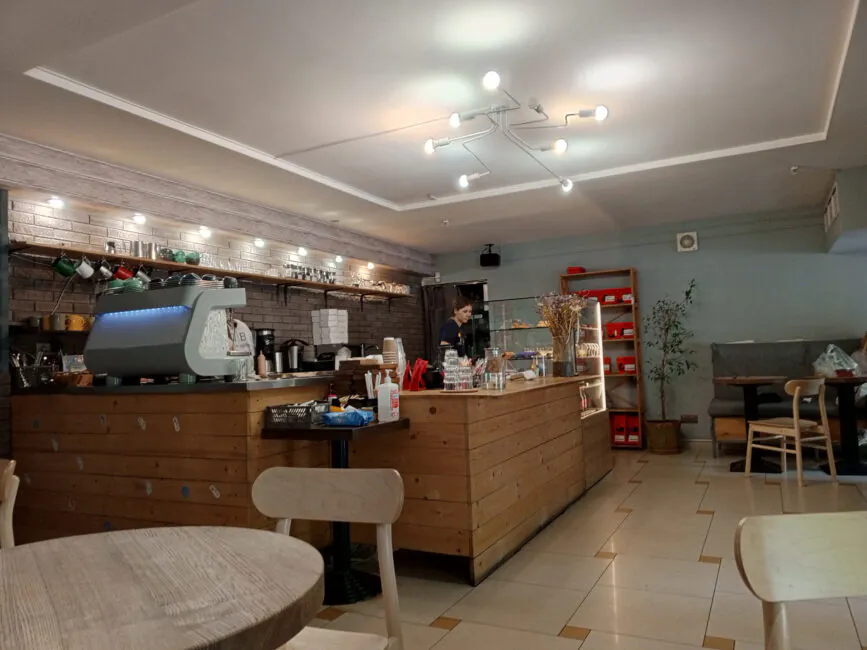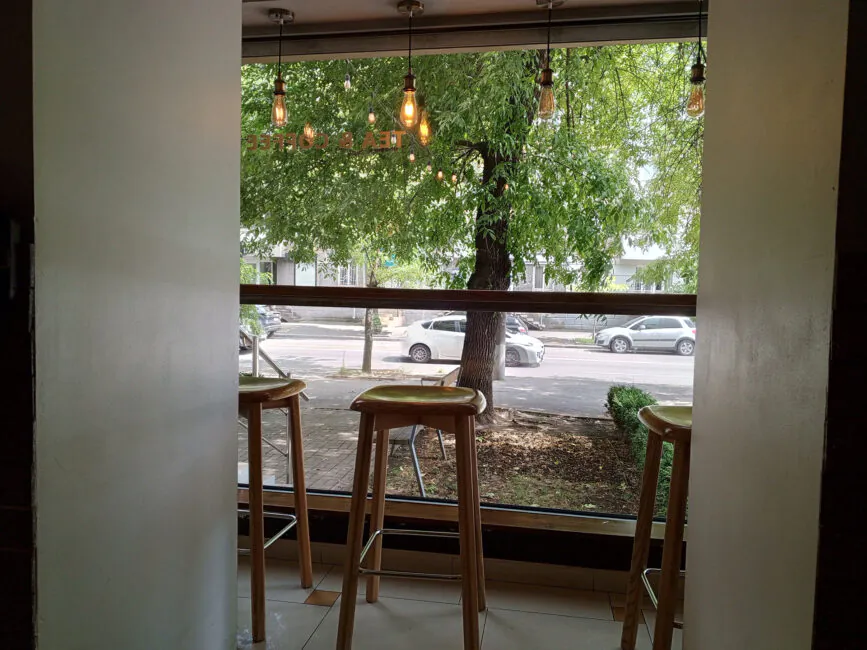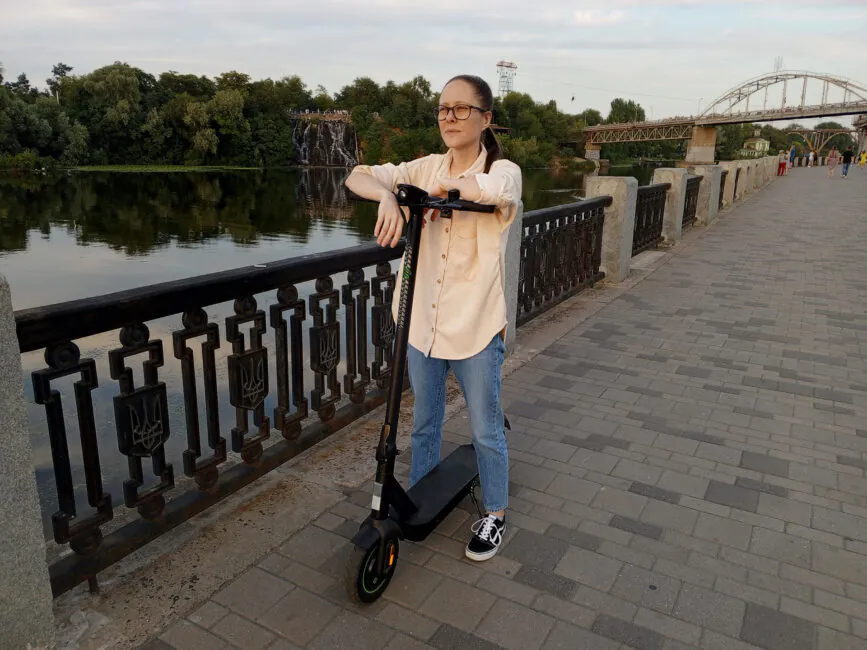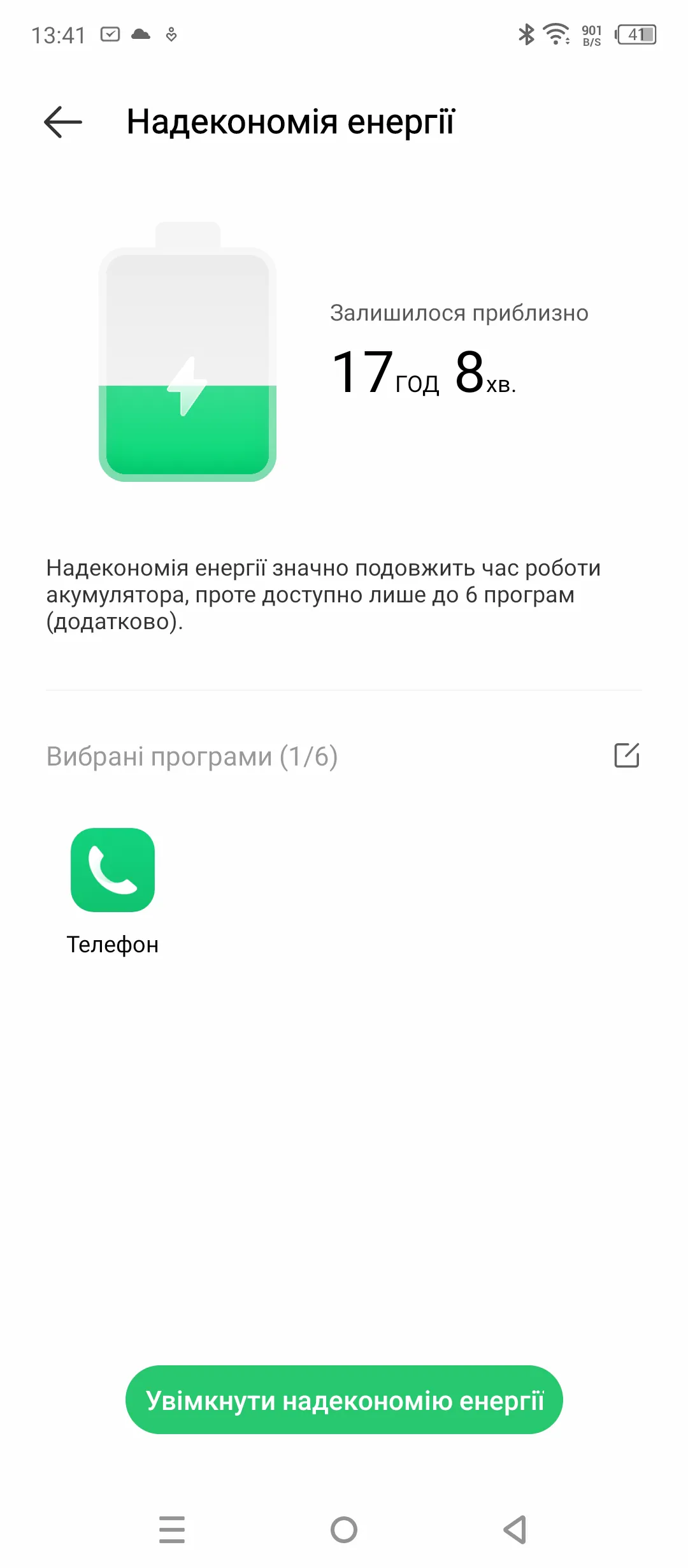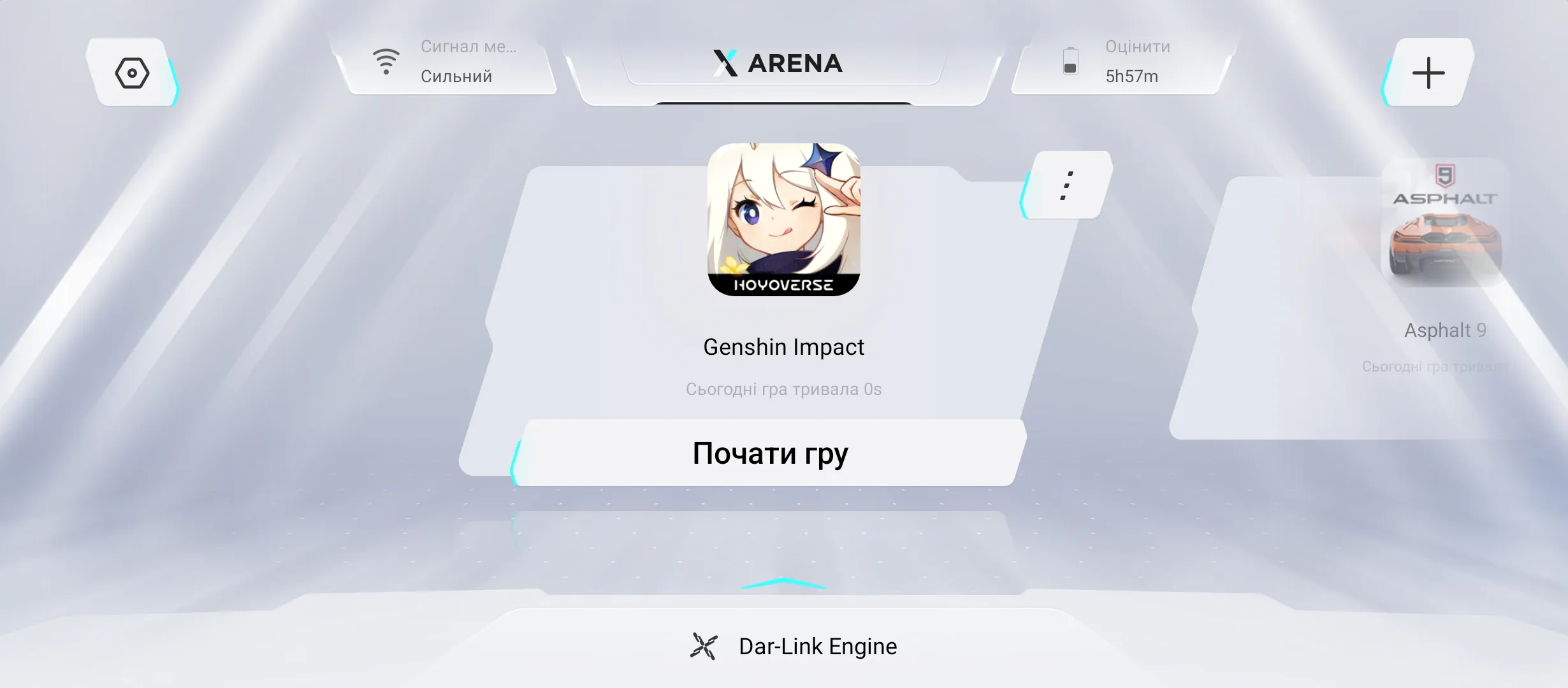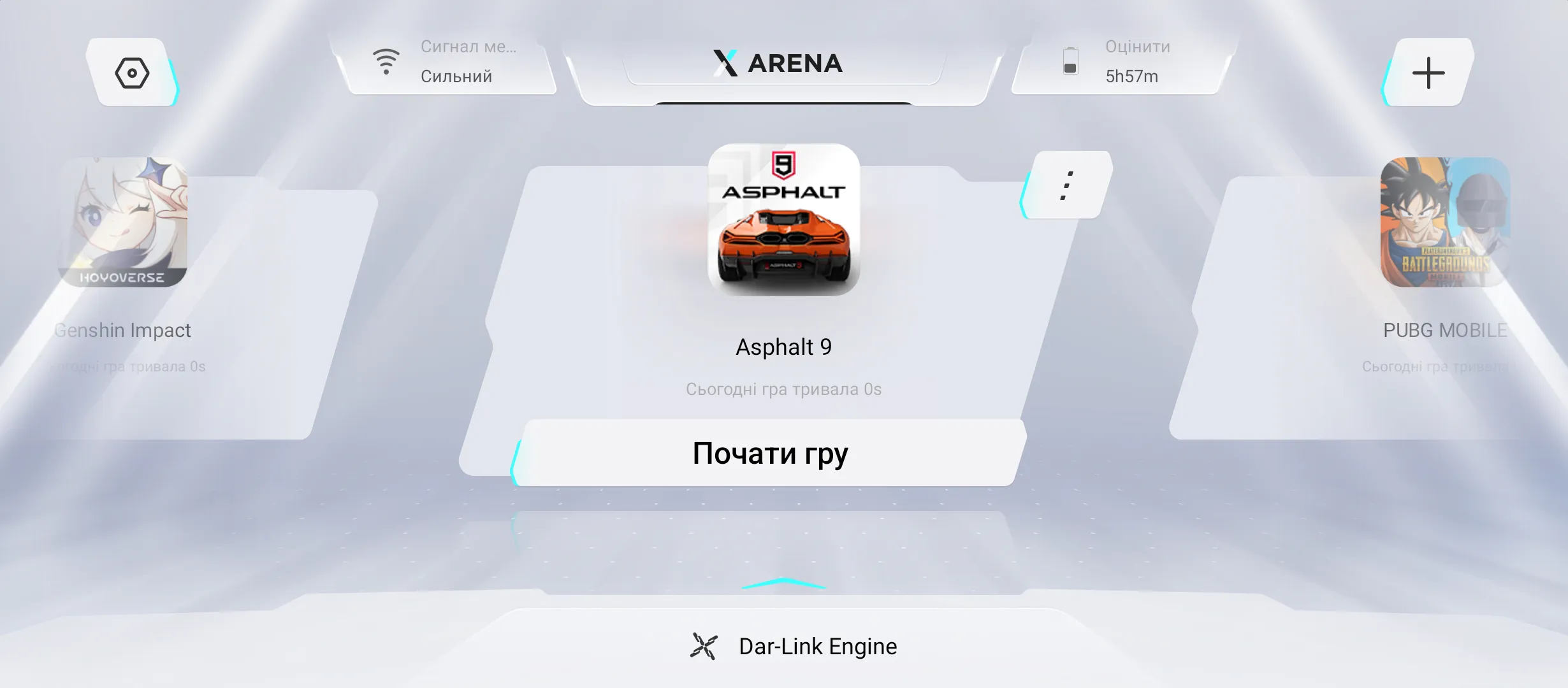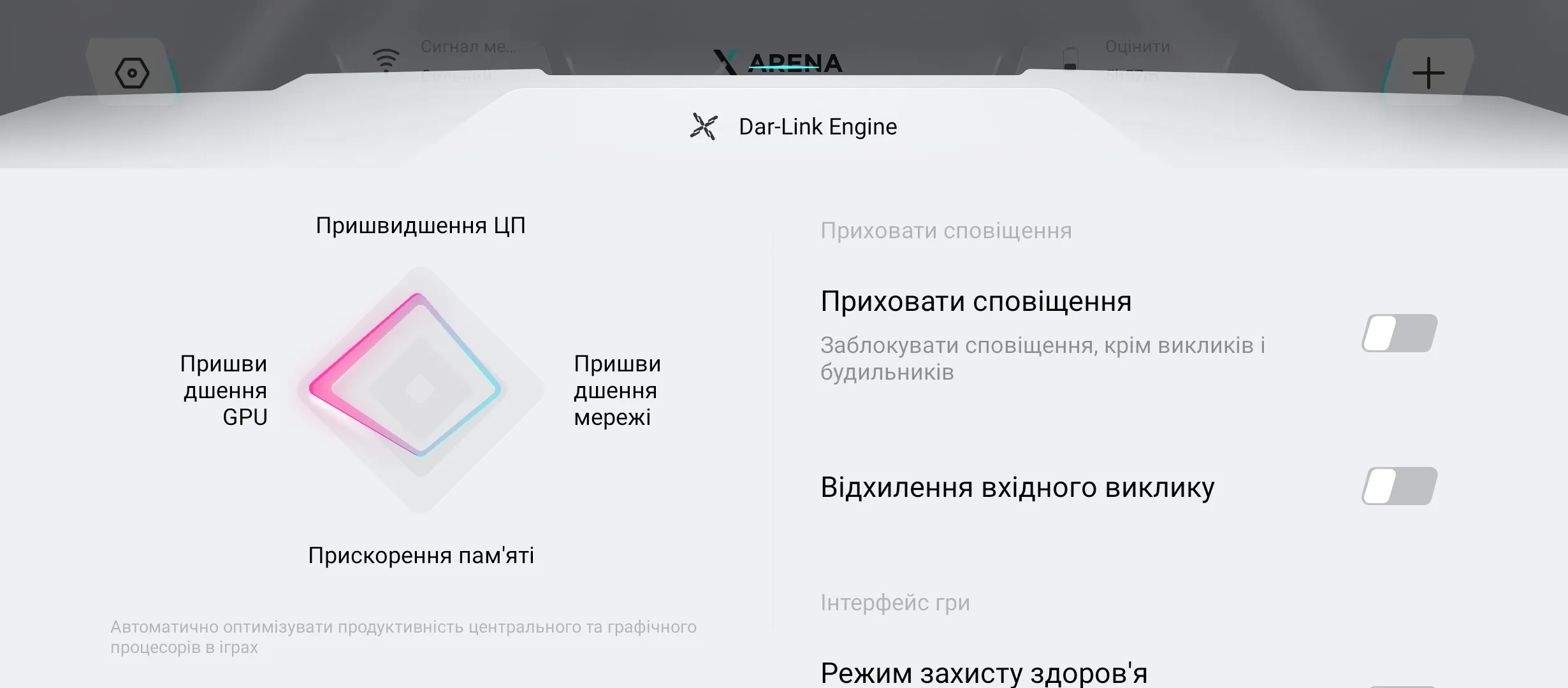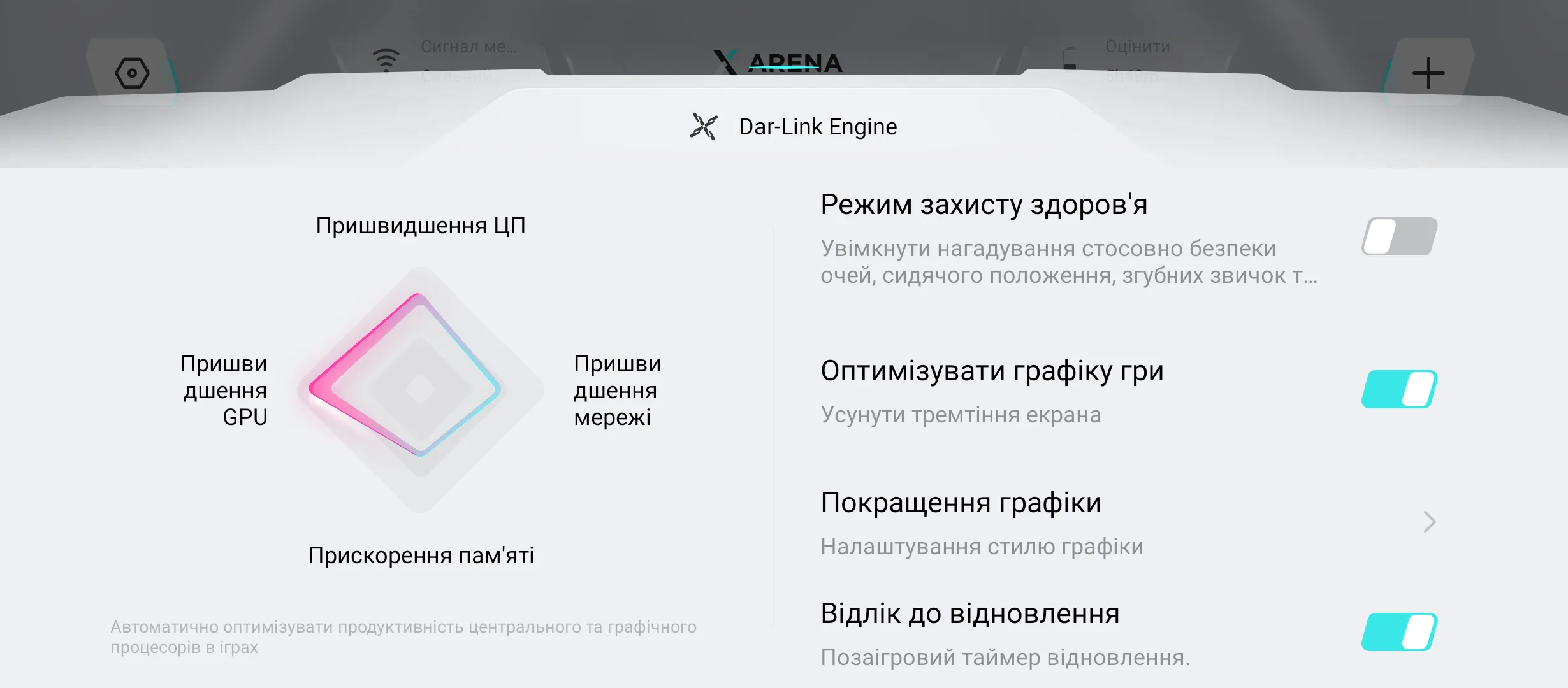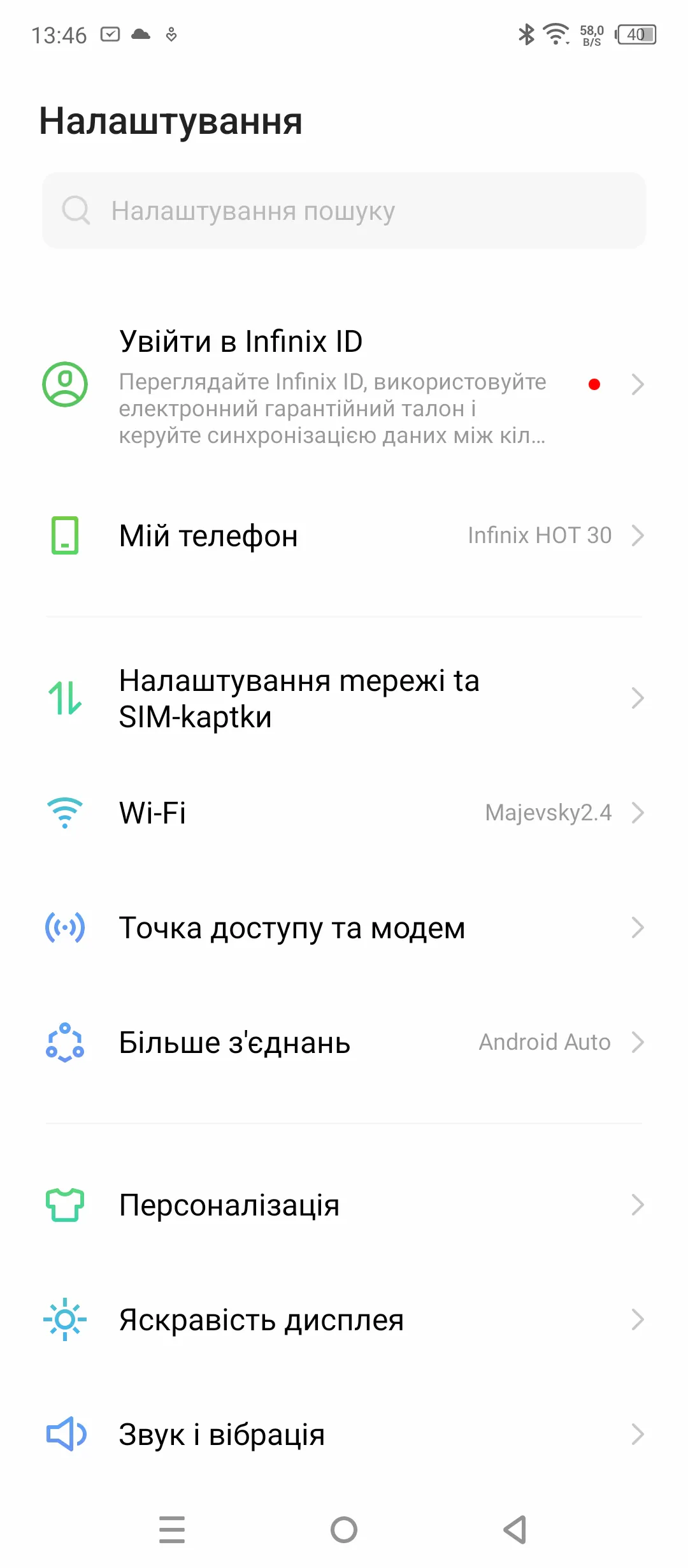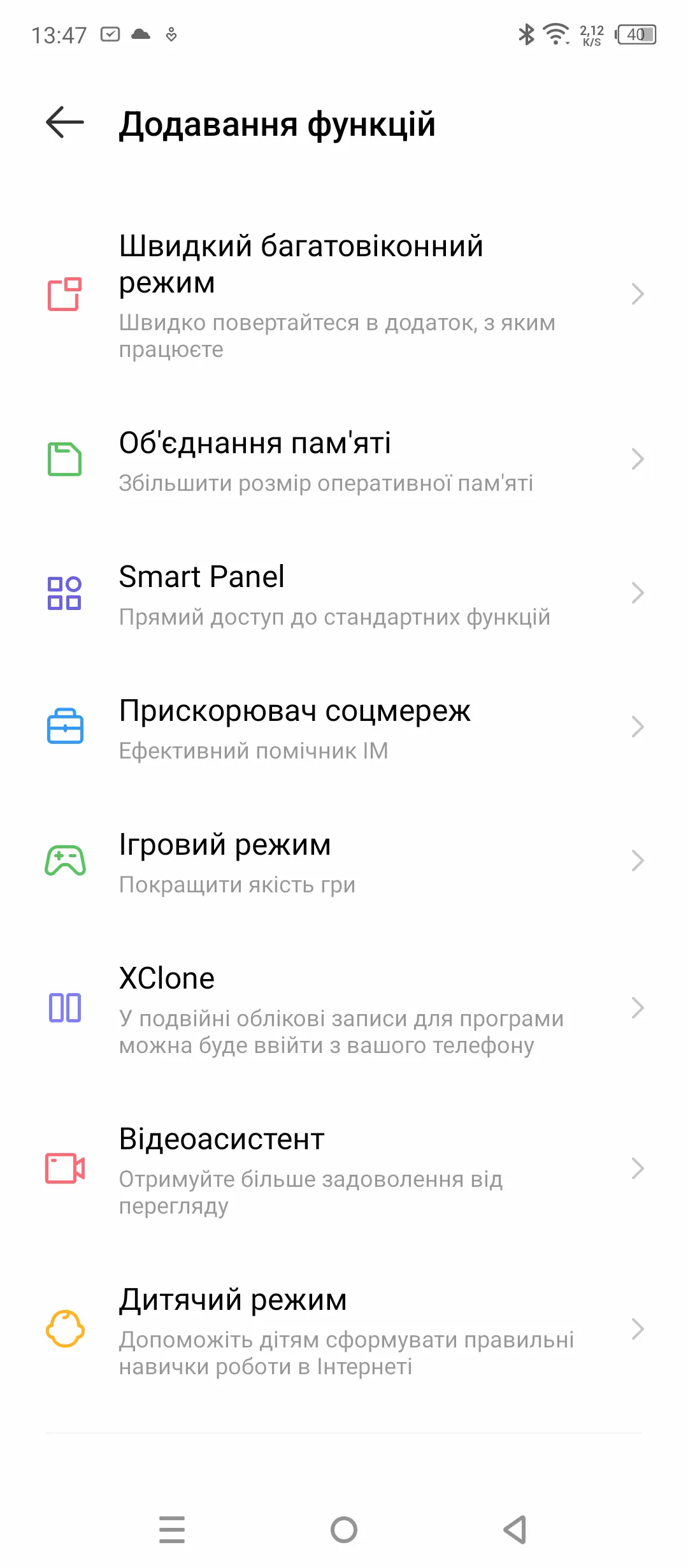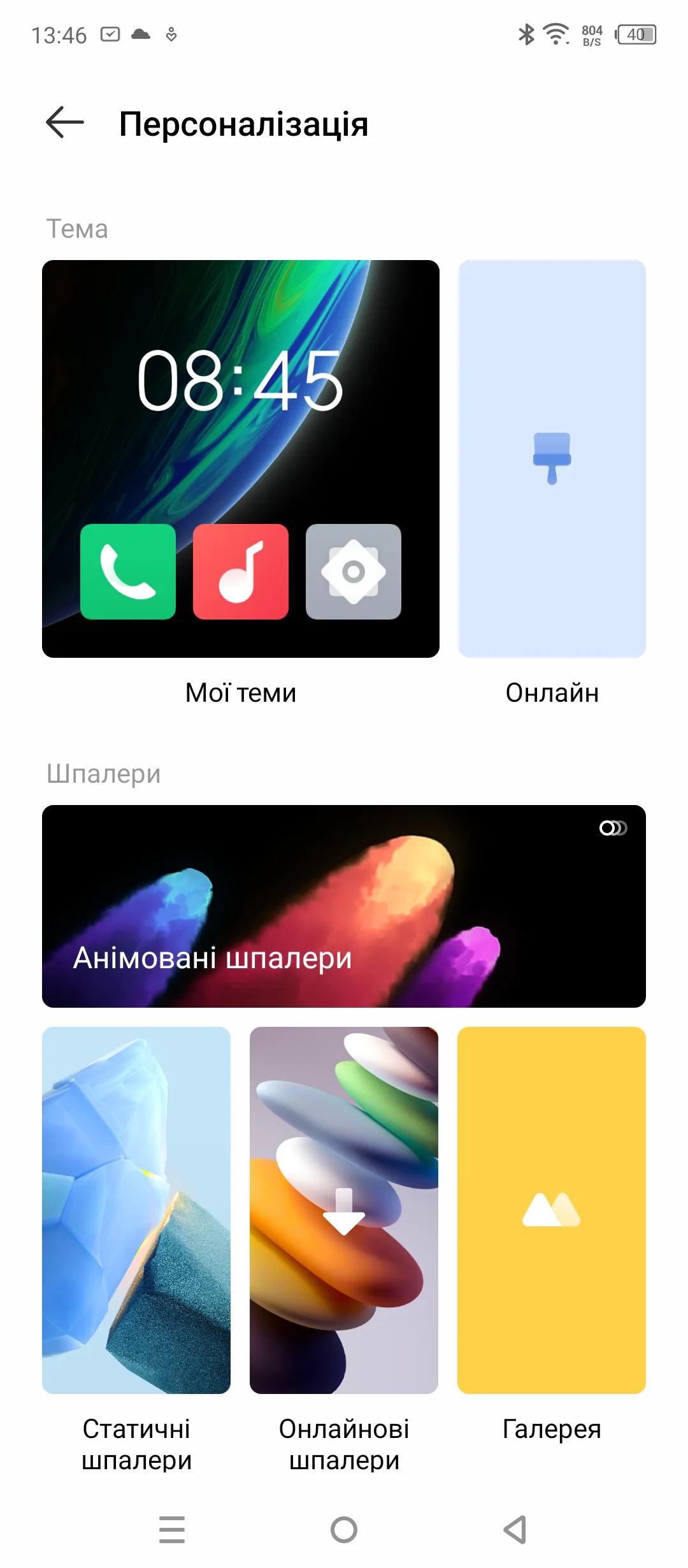© ROOT-NATION.com - Use of content is permitted with a backlink.
Today I have an interesting novelty on my review, a smartphone Infinix HOT 30. This is a budget model with very good stuffing, which went on sale in March this year. Of the interesting things that immediately catch the eye: the main camera at 50 MP, a large 6.78-inch display and design ─ I immediately liked it. Well, let’s take a closer look at this beauty, first let’s go over the main features.
Technical specifications
- Display: IPS LTPS, 6.78 inches, 2460×1080 resolution, 21:9 aspect ratio, 396 DPI pixel density, 90Hz refresh rate, 580 nits maximum brightness, 84.5% screen-to-body ratio
- Processor: MediaTek Helio G88, 8 cores (6 cores 1.8 GHz Cortex-A55, 2 cores 2 GHz Cortex-A75), max clock speed 2000 MHz, 12 nanometres
- Graphics chip: Mali-G52 MC2, clock speed 1000 MHz
- RAM: 8 GB, LPDDR4X type, clocked at 2133 MHz, expandable up to 3, 5, 8 GB
- Storage: 256 GB, type eMMC 5.1
- Main camera: 50MP, f/1.6 aperture, 1/2.55″ SK Hynix Hi5021Q (CMOS) sensor, digital stabilisation and zoom, photo resolution 4208×3120 pixels, video resolution 2K, 1080p, 720p at 30fps
- Front camera: 8MP, aperture f/2.45, photo resolution 3264×2448 pixels, video resolution 2K, 1080p, 720p at 30fps
- Battery: 5000 mAh non-removable lithium polymer (Li-Pol), maximum charging power 33W
- Operating system: Android 13
- UI shell: XOS 12.6.0
- Communication standards: 2G, 3G, 4G
- Wireless technology: Wi-Fi 5, Bluetooth 5, GPS, GLONASS, Galileo
- Support e-sim: no
- NFC support: yes
- Fingerprint scanner: Yes, in the power button
- SIM card slot: 2 NanoSim slots
- Memory card support: MicroSD, maximum capacity up to 1 TB
- Protection against water, moisture, dust: none, only tempered glass on the display
- Dimensions (H×W×T): 168.76×76.61×8.5 mm
- Weight: 196 g
- Accessories: smartphone, 33W charger, USB to USB Type-C cable, case, SIM card ejector, documentation.
Positioning and price
Infinix HOT 30 is positioned as a budget smartphone. It can be an ideal choice for those who are looking for an inexpensive and, at the same time, productive device. The stuffing and characteristics of the HOT 30 allow you to easily perform all the common tasks that can be put before a smartphone: calls, Internet, video, photos, multimedia, mobile games.
At the time of writing the review, the price of Infinix HOT 30 is $176.
Package contents
The Infinix HOT 30 comes in a brightly coloured branded box measuring 95×196×49 mm. Usually I don’t pay much attention to such things, but I must say that the box design is cool, it catches the eye right away, and this is the first pleasant impression of the product. Inside the box we are waiting for:
- smartphone
- protective film is installed on the display
- charger
- USB to USB Type-C cable
- case
- SIM card ejector
- documentation

The HOT 30 comes with a standard package. Yes, you could say: where is the headset? But, usually standard headphones everywhere are of such quality that they are simply not used in the future, so I do not consider it a minus absolutely. But thank you for the case! A simple silicone case, which is suitable for the first time, until you find something more interesting. It’s well made, no visible defects, no crooked adhesions or anything else. You could also say that there is no protective glass or film in the kit (yes, now some put it and it), but the protective film is already glued on the smartphone from the factory. Otherwise, there is nothing more to say about the package, everything is perfect.
Design, ergonomics, build
The design of the Infinix HOT 30 is quite original, I liked it immediately. The first thing that catches your eye is the colour, the model under test is called “Surfer Green”. In addition to green, there are also “Racing Black” and “Ultra White”. All the colours look cool, so Infinix has definitely got it right with the HOT 30.
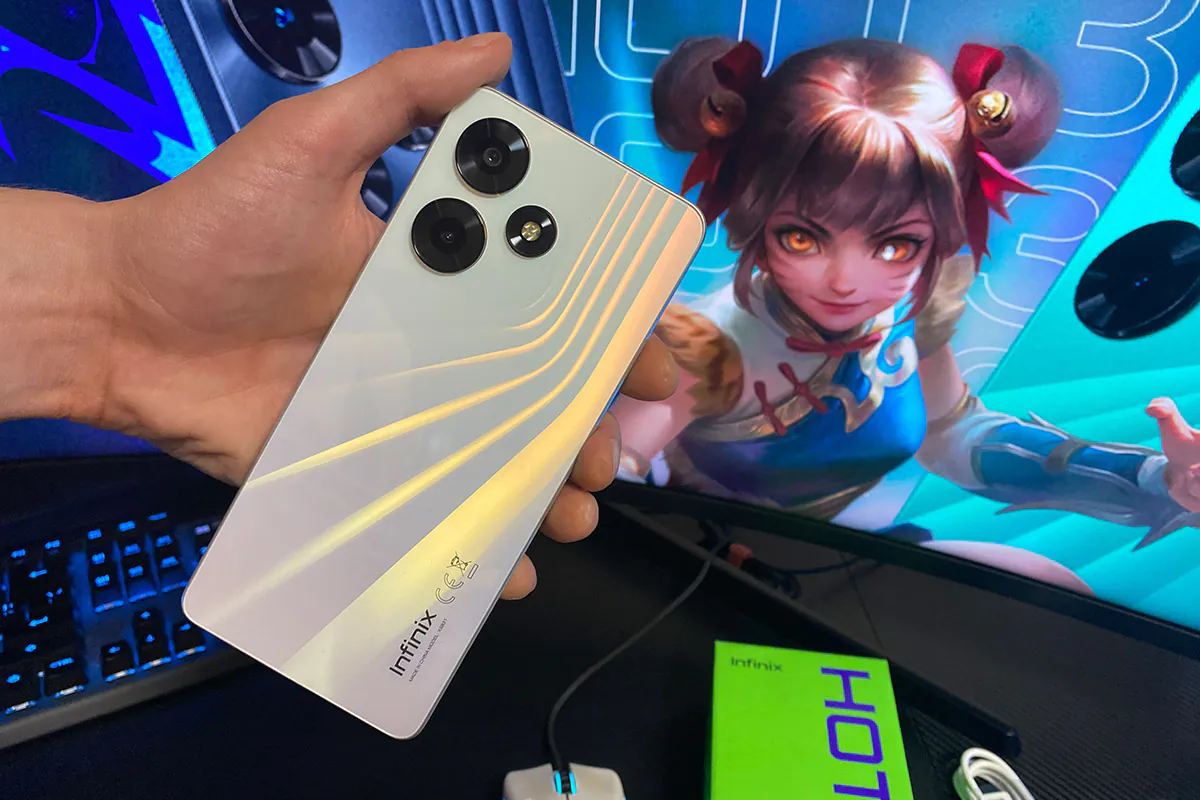 The front panel of the smartphone is occupied by a 6.78-inch display. There are bezels, but they are not big at all. On the top and sides – 4 mm, on the bottom – 7 mm. HOT 30 has a slightly non-standard format, it is narrowed in width and stretched in length. On the one hand, this is a plus – in this format various kinds of content (video, social networks) look good. On the other hand, it is a small disadvantage, well, for me personally ─ my thumb can’t reach the upper area of the screen without intercepting the smartphone in my hand.
The front panel of the smartphone is occupied by a 6.78-inch display. There are bezels, but they are not big at all. On the top and sides – 4 mm, on the bottom – 7 mm. HOT 30 has a slightly non-standard format, it is narrowed in width and stretched in length. On the one hand, this is a plus – in this format various kinds of content (video, social networks) look good. On the other hand, it is a small disadvantage, well, for me personally ─ my thumb can’t reach the upper area of the screen without intercepting the smartphone in my hand.
On the back panel there are cameras, by the way, quite impressive in size, the Infinix brand logo and a holographic pattern in the form of waves. By the way, the pattern in combination with the case material and colour gives the impression that it is glass, I thought so for the first time. In fact, it is not glass, but just an imitation of it. I have to admit, the look is really unusual and cool.
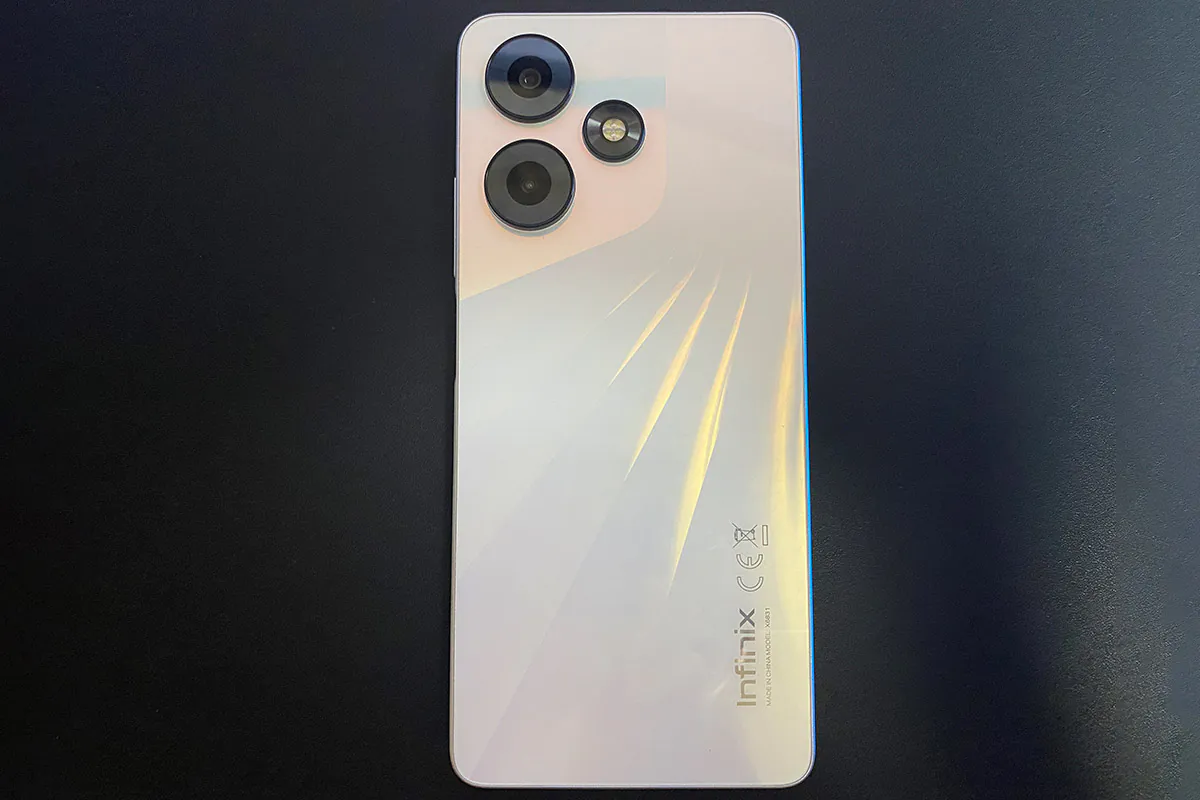
The HOT 30 has an unusual metal insert on the sides, which emphasises the originality of the design. Although, most likely, it is not metal, but aluminium, as it is not magnetic. Or a good imitation of metal. In any case, it looks original and, as they say, it is in the theme.
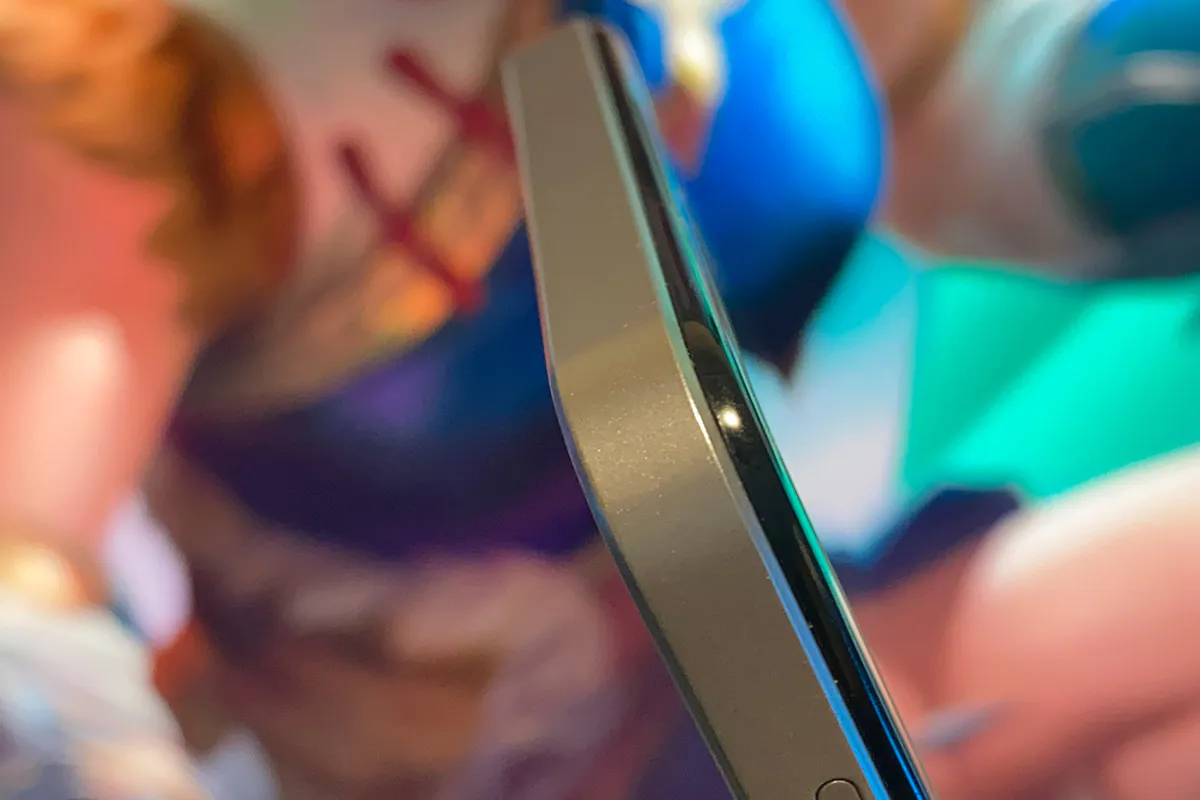
On the right side is the lock button, aka fingerprint scanner, and the volume button. Due to the HOT 30 format, the buttons are raised quite high, so it was a bit unusual at first.
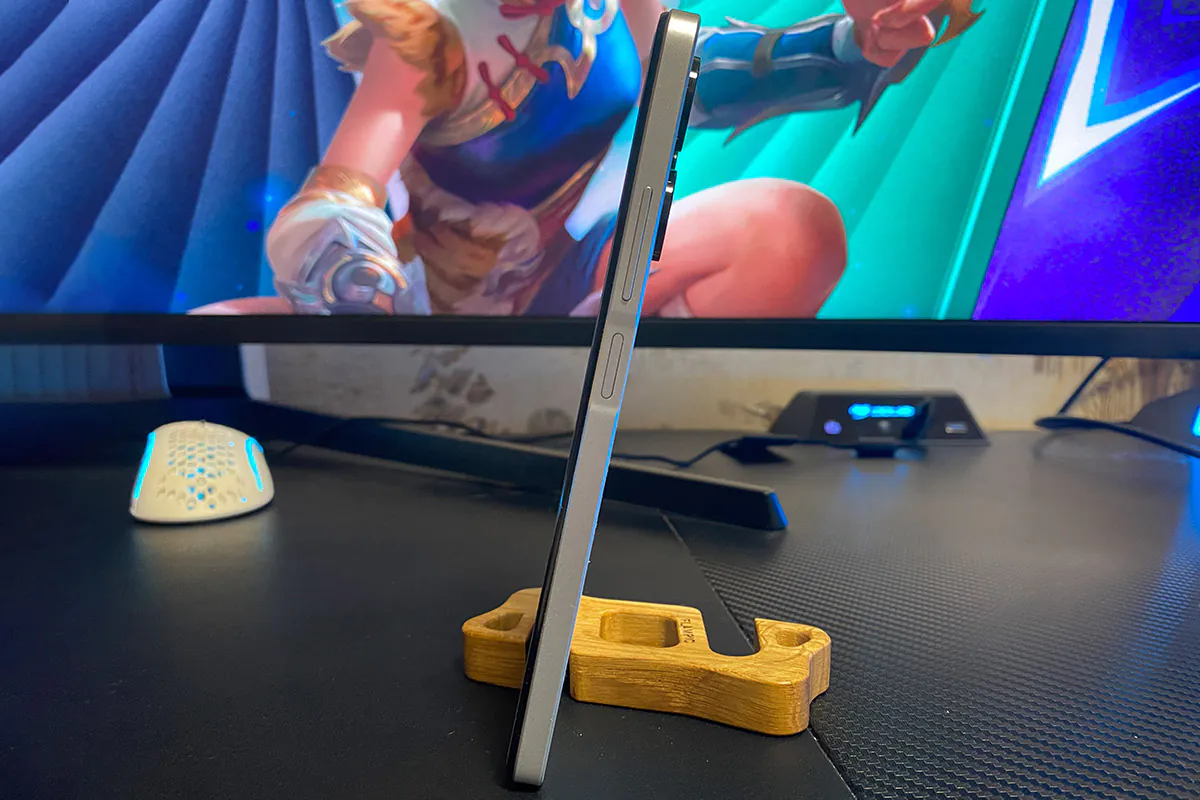
On the left side we have only the SIM card tray. The most usual one, opened with an ordinary ejector.
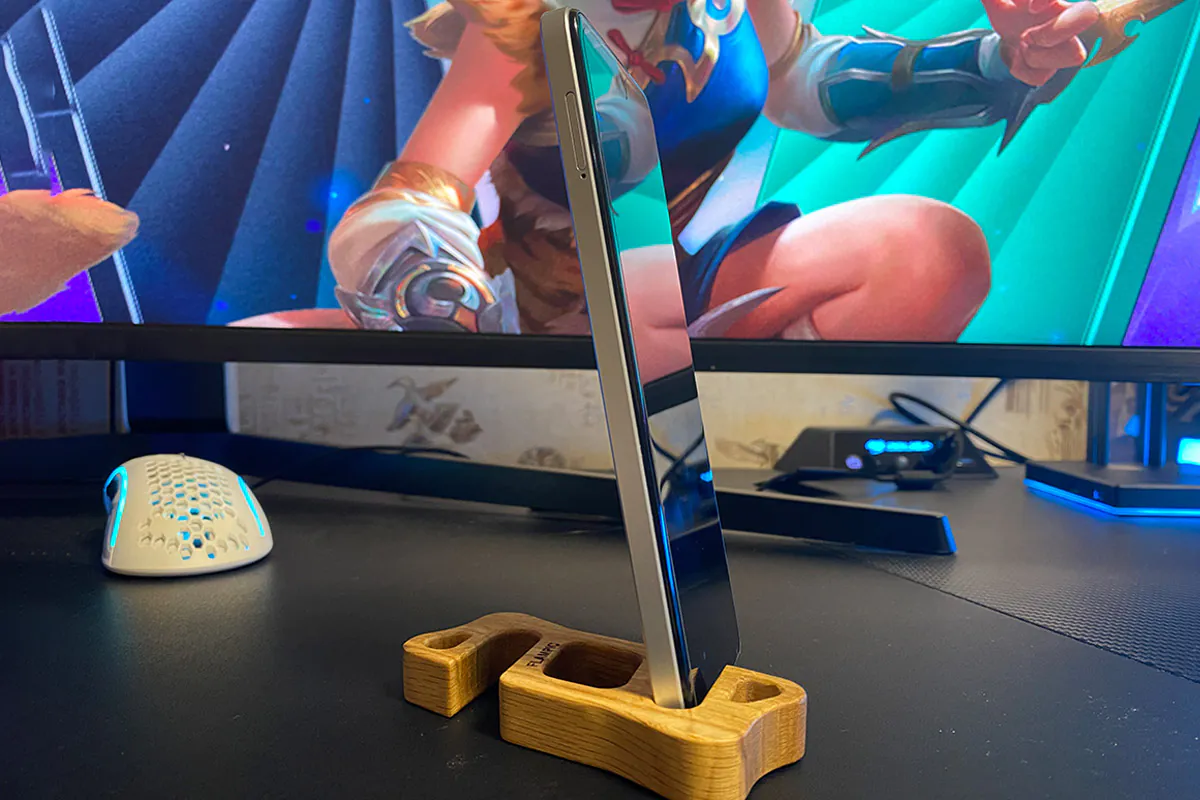
On the top, of course, there is nothing interesting. On the bottom there is a USB – USB Type-C connector, a 3.5mm headphone jack and holes for speakers and microphone.
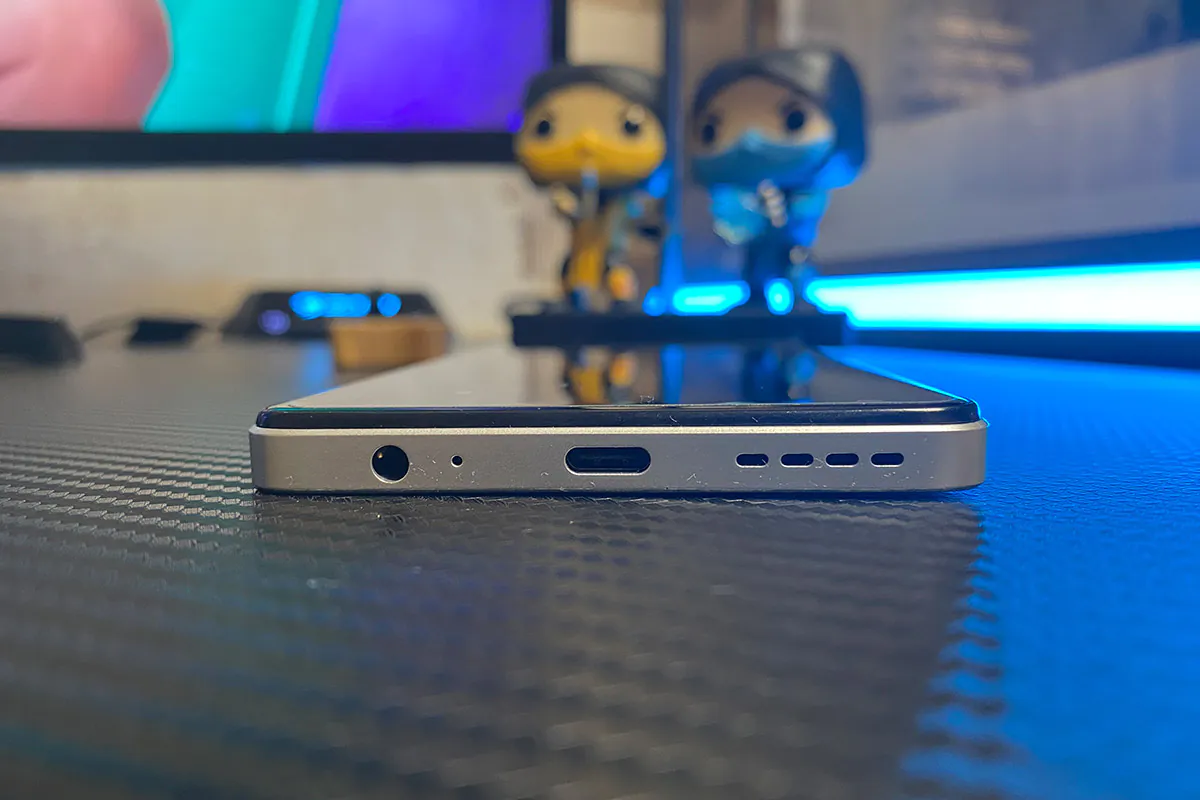
In general, the design is excellent, the location of the smartphone controls is convenient. At first, it may be uncomfortable for some people, like me, because of the elongated format of the HOT 30, but it’s all a matter of habit. The smartphone itself is light, weighing only 196g, and thin. It is pleasant to hold in the hand, largely due to the materials and design features.
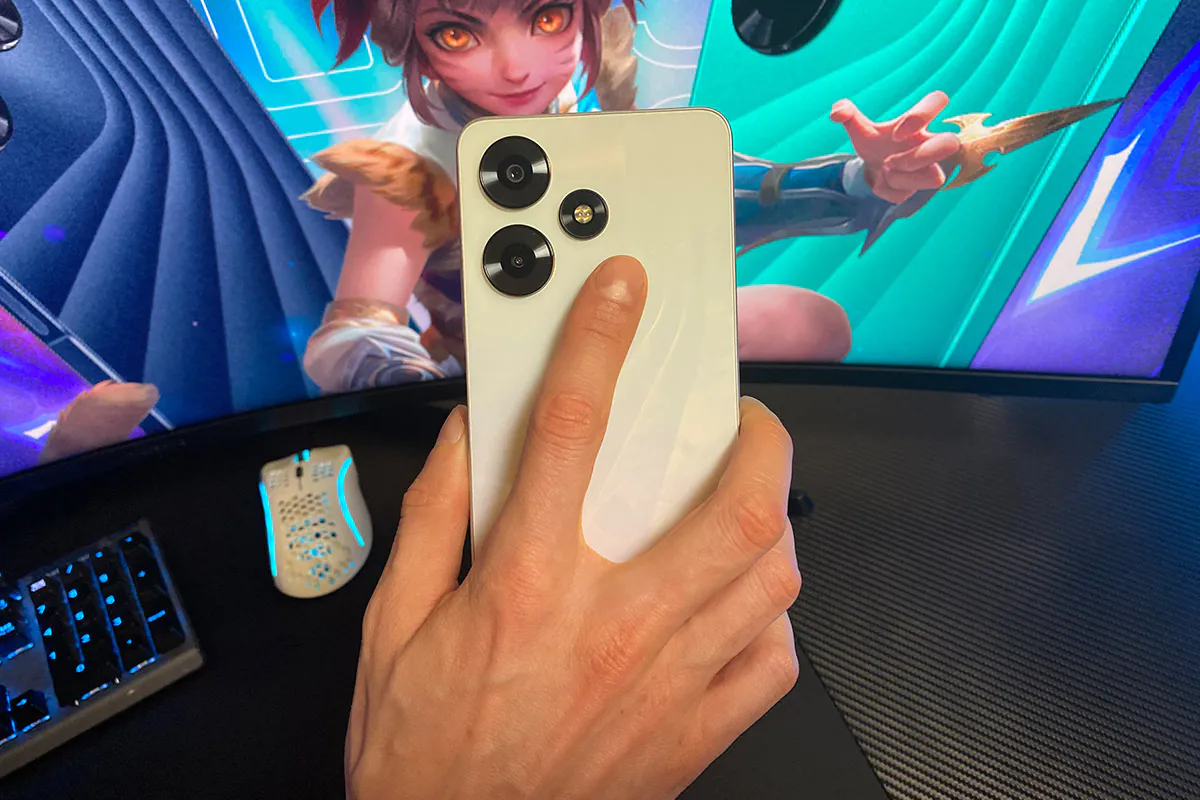
Speaking of materials and assembly itself. The main material here ─ plastic, which skillfully imitates glass, and aluminium on the insert on the sides. There are no complaints about the build quality, the smartphone is well assembled, nothing luffs or creaks.
Read also: Infinix Zero Ultra smartphone review: Is it a flagship or not?
Screen
The Infinix HOT 30 sports a 6.78-inch IPS LTPS display with a resolution of 2460×1080 pixels. The aspect ratio is 21:9. The refresh rate of the screen is 90 Hz. Pixel density 396 DPI. Maximum brightness of 580 nits. The screen-to-body ratio is 84.5 per cent.
By feel, the display is great. Smooth picture, saturated colours, everything looks very decent on it. Sensitivity is good, the display responded quickly and adequately to all swipes and gestures. Text on HOT 30 is clear, everything is readable perfectly.
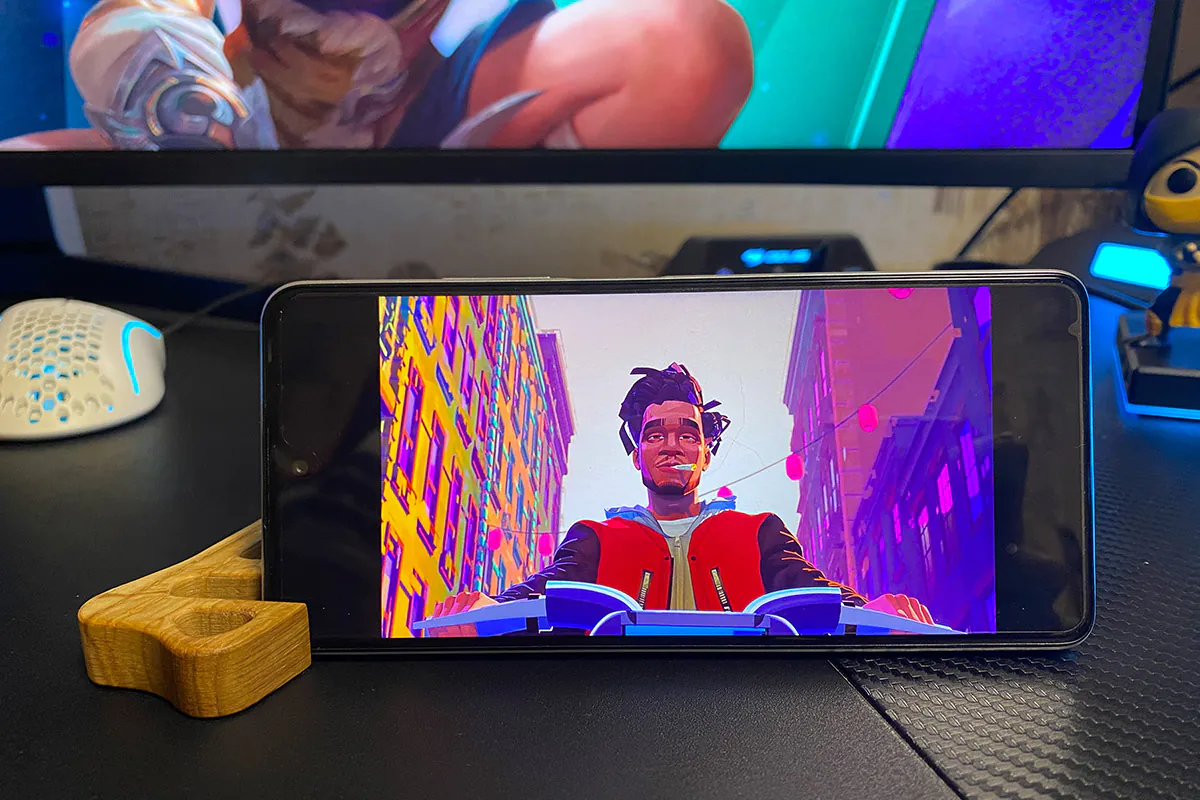
Among other things, the HOT 30 display utilises Sunlight Readable Dark Zone Enhancement (DRE) technology. This is noticeable when watching content. During my testing I was able to watch a few films on it and I can tell you that the HOT 30 is perfect for watching videos. The format is also important, the HOT 30’s display is slightly narrower in width and longer in length, which has an effect when watching videos and playing games. And social networking feeds are more pleasant to browse on this format, in fact, more content fits into the screen.

The maximum brightness here is 580 nits, so it is comfortable to use the smartphone outside in the blinding sun. Well, not exactly ideal, let’s say, but still things are a bit better than on many other smartphones with similar displays.
Performance
According to my personal experience, the Infinix HOT 30 is pretty good in terms of performance. Nothing lags while navigating through the menus and settings of the smartphone itself, the response is good. Applications open, minimise and switch between applications quite quickly. Internet surfing on HOT 30 is also pleasant, websites open quickly and navigation through them without any slowdowns or other problems.
But feelings are such, let’s still take a detailed look at its stuffing. As for the filling, we have the following:
- MediaTek Helio G88 processor
- Mali-G52 MC2 graphics chip
- 8GB LPDDR4X RAM
- 256GB eMMC 5.1 eMMC 5.1 data storage
See the screenshots for more detailed specifications:
Now let’s take a closer look at each component and run a couple or three tests to better understand the performance level of the Infinix HOT 30.
Processor and graphics chip
12-nanometre 8-core MediaTek Helio G88. 6 cores of 1.8 GHz Cortex-A55, 2 cores of 2 GHz Cortex-A75. The maximum clock frequency is 2000 MHz. For graphics is responsible Mali-G52 MC2 with a clock frequency of 1000 MHz. In principle, not a bad bundle for a budget smartphone, but for resource-intensive games like Genshin Impact and PUBG Mobile graphics, most likely, you will have to reduce the settings to low.
RAM
The Infinix HOT 30 comes with 8GB of LPDDR4X type RAM by default and is expandable. You can even choose how much to increase the amount: 3, 5 or 8 GB. This is done in the smartphone settings, in the “Memory Combination” menu. Additional RAM is increased at the expense of space on the internal storage. We have 256 GB here, so you don’t have to worry about it, you can increase the memory by 8 GB and get as much as 16 GB of total capacity.

Data storage
The Infinix HOT 30 has 256GB of eMMC 5.1 storage. An old, but time-tested type of memory. Yes, I would have liked to have UFS instead of eMMC, but then the price of the device would have gone up, so it’s a moot point. As for the volume, 256 GB is more than enough for me. Speaking about the speed of the drive – it feels pretty good, but the test results will tell better than me.
 As you can see, Infinix HOT 30 has a good stuffing on board. Let’s run a few benchmarks for a better understanding of the picture. For the tests we will take: Geekbench 6, PCMark for Android, 3DMark, AnTuTu Benchmark.
As you can see, Infinix HOT 30 has a good stuffing on board. Let’s run a few benchmarks for a better understanding of the picture. For the tests we will take: Geekbench 6, PCMark for Android, 3DMark, AnTuTu Benchmark.
Performance in games
I’ve already said that in resource-intensive games you will most likely have to reduce graphics settings to low, but what about games in general? Let’s run a few and see the results for ourselves.
Asphalt 9: Legends
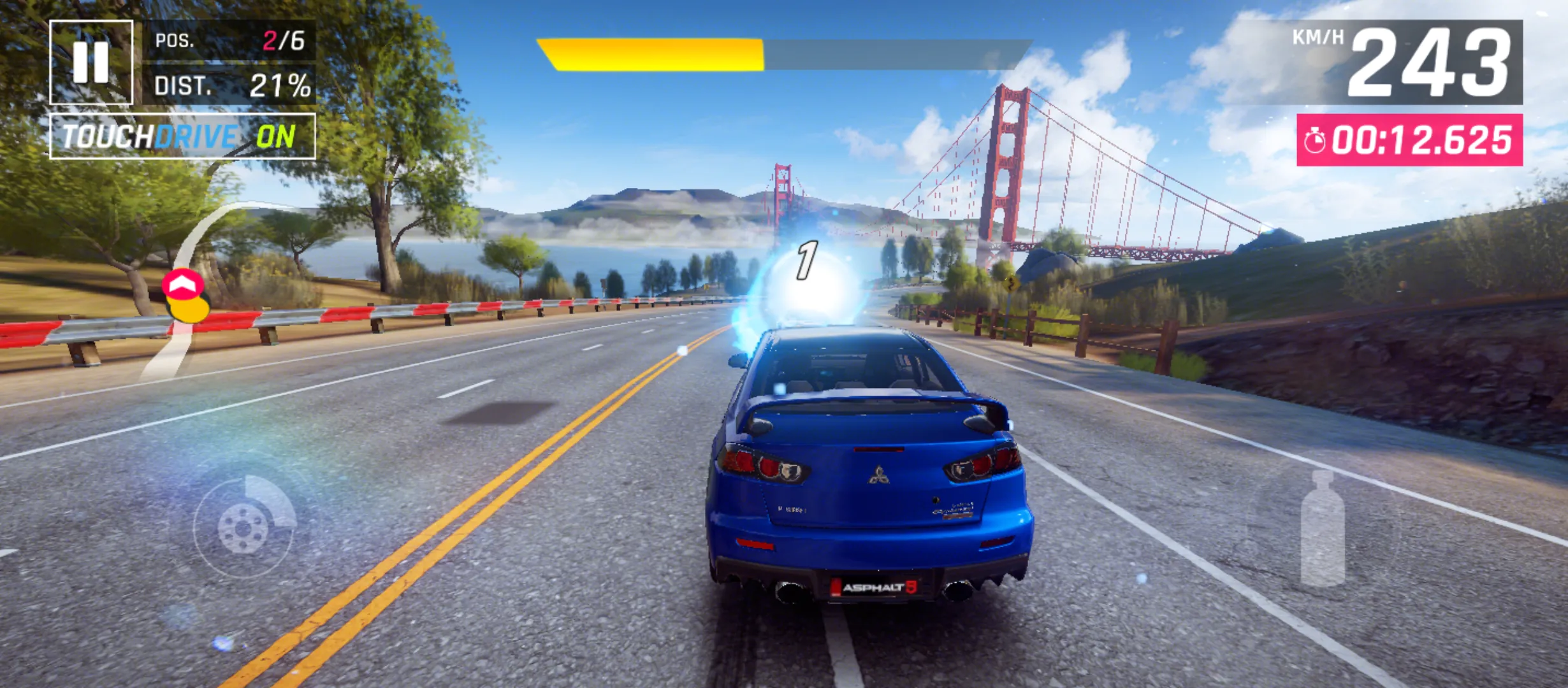
In general, the game plays quite well, but on the “High Quality” setting FPS, as I feel, is a bit low. At high settings Asphalt 9 produces about 24 – 30 frames per second. Resetting the settings to the “Performance” preset doesn’t really save the situation, it feels like it adds only a couple of frames, but still there are FPS drops in heavy scenes.
Genshin Impact
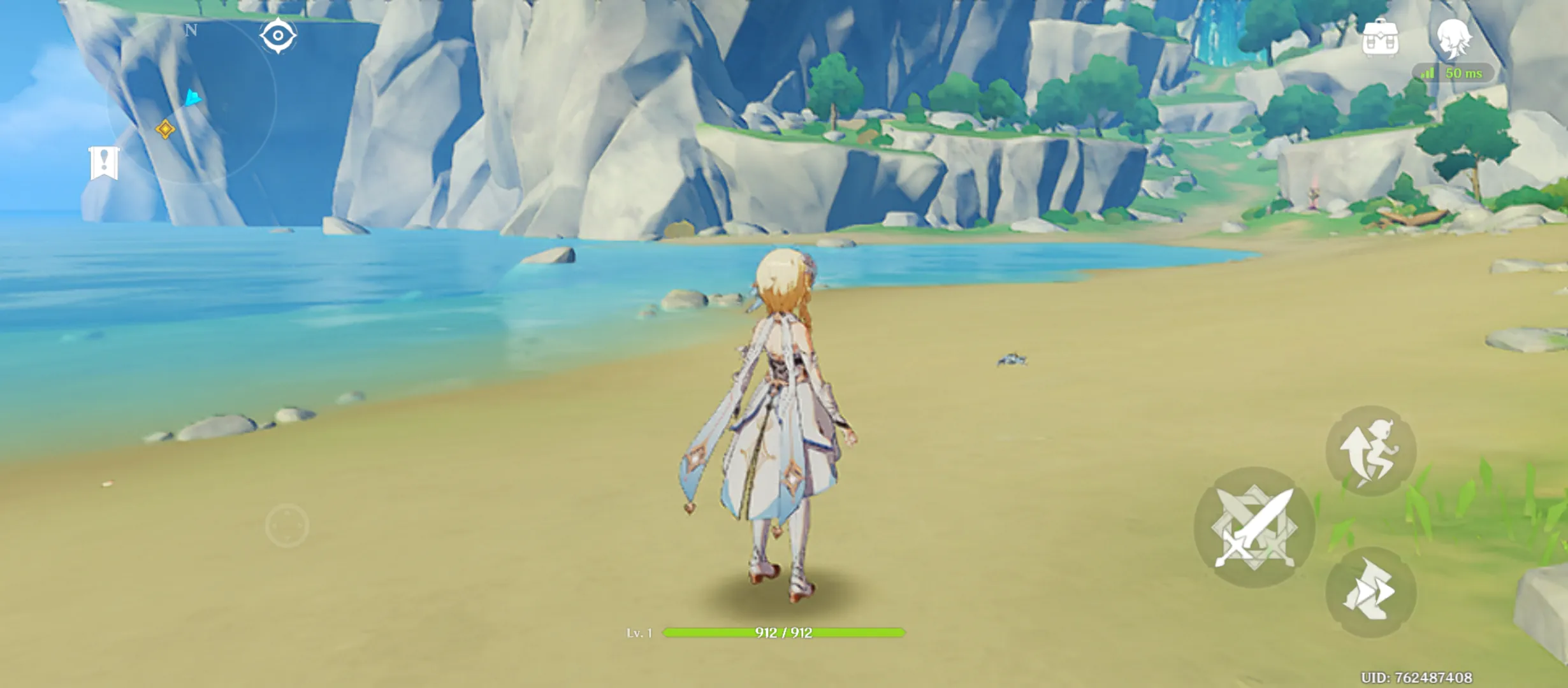
At low settings the game produces about 20-30 frames, in some places there are freezes. In principle, you can play, but again FPS, as I think, underestimated.
Ni no Kuni: Cross Worlds

With Ni no Kuni: Cross Worlds things in terms of performance are slightly better than with Genshin. It feels more stable 30 FPS, but again, at low settings. In principle, it is possible to play.
In general, it is possible to play modern games on Infinix HOT 30, but with low settings and not very high FPS. But this applies to modern resource-intensive games. If you take something simpler, some undemanding games, like Angry Birds or Zuma, things are much better with them. They play comfortably and without problems.
Read also: Oukitel WP22 review: rugged smartphone, speaker and power bank!
Camera
One of the features that makes the Infinix HOT 30 worth paying attention to ─ the camera. Externally, the camera modules look very solid. But what about the features and specifications? Let’s have a look.
The main camera here is 50 megapixels, 1/2.55″ sensor from SK Hynix Hi5021Q (CMOS), aperture f/1.6. There is digital stabilisation and zoom. Photos are shot in 4208×3120 pixel resolution, video can be recorded in 2K, 1080p, 720p at 30fps.
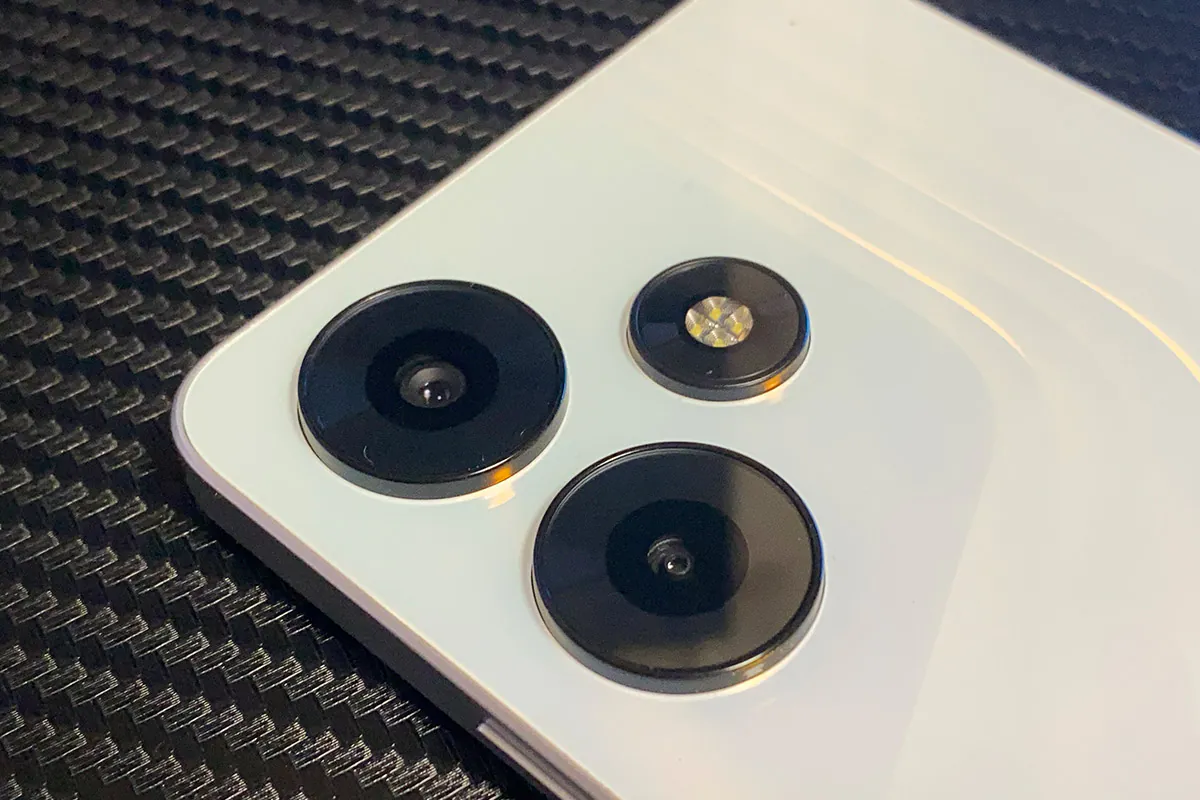
The front camera is 8 megapixels, aperture f/2.45, photo resolution 3264×2448 pixels, video resolution 2K, 1080p, 720p at 30fps.
Camera app
Despite the fact that we are looking at a budget smartphone, the camera application in it is implemented, without exaggeration, cool. It opens up a lot of interesting features that not every top-end device can boast of. So, we open the application and see a large list of settings.
Let’s start with the top panel. The first symbol located on the left is Settings. Opening it, we see a menu that provides an opportunity to customise the phone’s camera to suit yourself. The menu contains the following:
- HDR mode, which is set to Auto by default (you can switch it off completely if you wish, but it is the mode that improves the depth and dynamic change of the picture during shooting)
- Watermarks, which can be set manually or disabled (the following marks are present and will be automatically added to your photos: Date & Time, City, Phone Model, Send Message)
- Timer that can be set for 3, 5 or 10 seconds
- Location (will pull up your geolocation)
- Horizontal level, which will help keep the horizon clear when taking pictures
- Ability to set options for the volume button – shutter sound or zooming
- Organise modes, which allows you to change, add or remove modes on the main display manually
- AI portrait enhancement (set to Auto by default)
- Scanning QR codes – an incredibly useful feature, as they’re everywhere nowadays
- Pressing the shutter with your fingerprint (a somewhat odd feature, but it’s there!)
- Restore default settings, so you can reset all the settings that have been set by the user
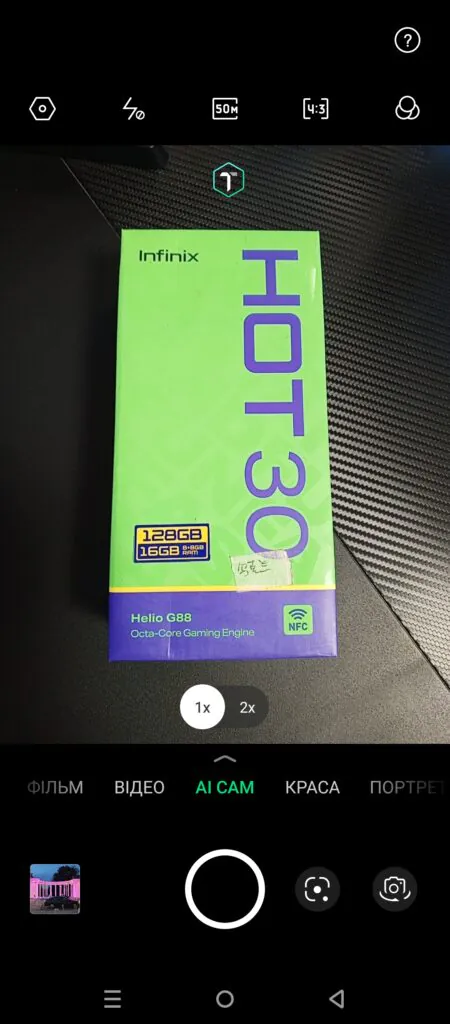
Additionally, in the main Settings menu, you can:
- Enable Grid, which helps the user to get the right composition in the frame
- Customise camera control using Gestures
- Enable Dynamic Mark Focus on Objects

We continue exploring the top panel of the camera display. The next mark is the Flash, which you can switch on, switch off, set the flash to auto mode or switch on permanent illumination if you’re taking photos in total darkness.
The next symbol is the mysterious 50m. It actually just turns on the 50MP Super Wide Angle Lens. This is followed by the Screen Aspect Ratio – widescreen, 4:3 and 1:1. The last option on top of the camera’s display panel is Filters, which lets you set the colour tone of your photo (Original, Forest, Freshness, Fade, Nature, Baby, Shades of Blue, Fire, Mono).
Let’s move on to the main features of the smartphone, which are located in the bottom panel of the display.
Opening the camera app, it is in AI CAM mode by default. This is a basic mode that does not require manual settings, i.e. in it the camera itself dynamically changes the scene, uses HDR, picks up lighting, etc. It’s a mode for the lazy: switch it on, point the lens and take a good photo right away. Very convenient.
Next – Beauty. This mode allows you to make the model slimmer, enlarge hips, lengthen legs and so on. In other words, it’s a kind of instant Photoshop. It works a bit rough, but it is possible, and it is good.
Portrait is a familiar mode of portrait shooting, which, by the way, works quite well. In daylight the camera perfectly copes with the clarity of the immediate subject and makes an effective bokeh.
Super Night is a night mode that allows you to take photos in low light or in the dark.
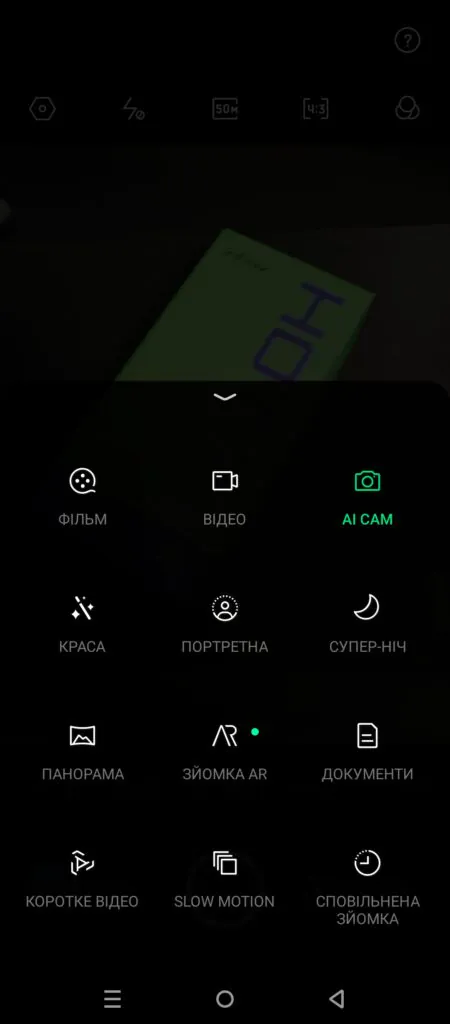
Video – it is clear that this is the mode of video shooting in 3 quality options: 2K, 1080p and 720p at 30 FPS. The most interesting is the Film mode, which gives you the opportunity to create spectacular videos using the following filters and transitions:
- Motion (duration – 13sec) – dynamic clips with colourful transitions
- Performance (duration – 18sec) – suitable for capturing singing or dancing
- Travel (duration – 14sec) – creates impressive clips during your travels
- Vintage (duration – 14sec) – retro effect for stylised videos
- Family (duration – 18sec) – record family gatherings
- Street (duration – 14 sec) – captures cars and people on the streets
- Superstar (duration – 15sec) – suitable for action sequences
- Rhythm (duration – 15sec) – for rhythmic videos
- Sports (duration – 13 s) – for capturing sporting events
- Party (duration – 9 s) – for filming cool parties
Each scene has a unique musical accompaniment that is automatically overlaid on the video you shoot. It has the appropriate mood and dynamics to make each of your videos colourful and impressive.
More modes can be found in the Settings – Organise Modes tab. There the user will have access to:
- AR photography
- Panorama
- Documents
- Short video
- Slow Motion
- Slow motion
Each can be dragged in place of one of the preset modes and used when shooting from the main menu located on the bottom panel of the camera’s display.
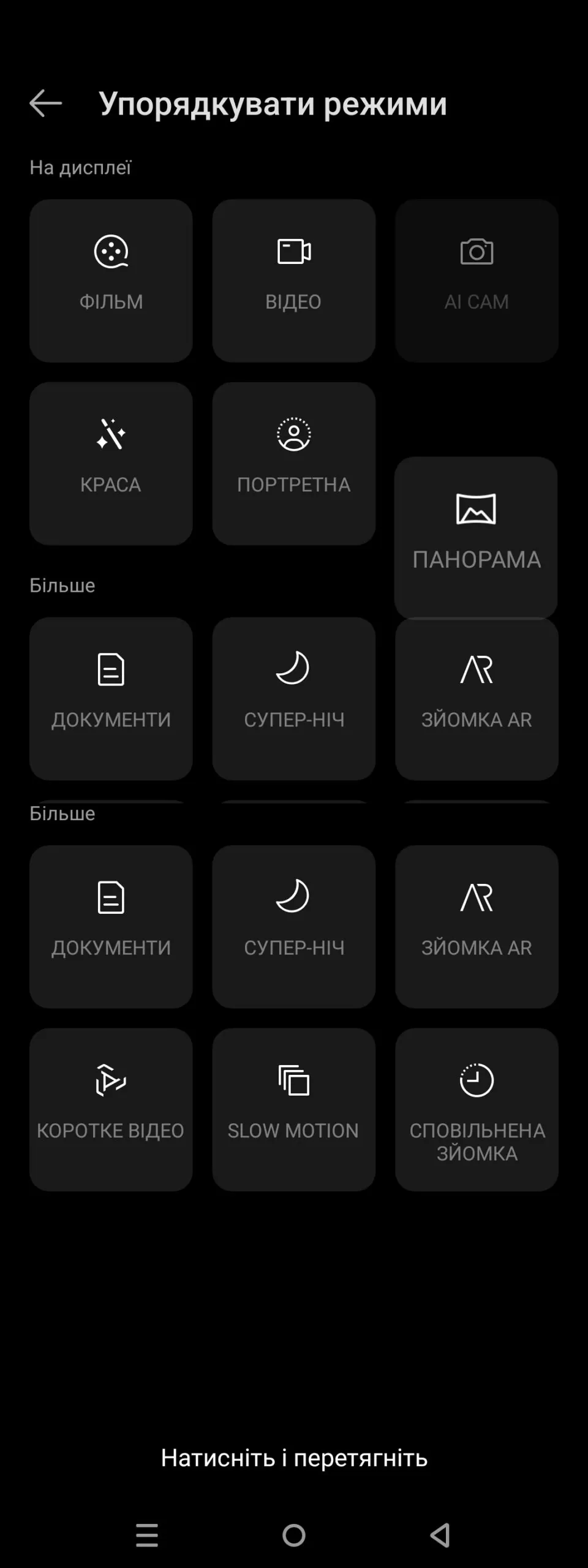
The camera app here is really rich in various cool features. With them, you can shoot cool photos and videos with additional effects in good quality, both day and night. Thanks to this set of features, you can create impressive visual content turnkey, that is, right in the process of shooting without post-processing.
Examples of photos
In my opinion, the photos on the Infinix HOT 30 turn out great. Here are a few examples to illustrate. Examples of photos in the daytime, natural light:
Examples of photos of various subjects and objects:
Examples of indoor photos, artificial lighting:
Examples of photos with a zoom of ×2 (more is possible, but quality is lost):
Examples of photos in the evening, artificial light:
Examples of photos with Super Night mode, off/on:
Examples of photos in portrait mode:
Examples of selfies, front camera:
Examples of panoramic photos:

Video Examples
I can’t say anything bad about the video either, it shoots well. Of course, I would like to be able to shoot in 60 FPS, at least in 1080p. But we have what we have, as they say. Examples of filmed videos are given below. Examples of video in daytime, natural light (comparing 2K, 1080p, 720p at 30 FPS) – main camera, 2K 30 FPS:

Main Camera, 1080p 30 FPS:

Main Camera, 720p 30 FPS:

Main camera, vertical video, 2K 30 FPS:
Main camera, vertical video, 1080p 30 FPS:
Main camera, vertical video, 720p 30 FPS:
Front camera, 2K 30 FPS:
Front camera, 1080p 30 FPS:
Front camera, 720p 30 FPS:
Main camera, static video, 2K 30 FPS:

Video examples in the evening – main camera, 2K 30 FPS:

Front camera, evening:
Examples of video “films” (street, vintage, party) – “Party” films:

Vintage Films:

“The Street” film:

Sound
The Infinix HOT 30 has stereo speakers with DTS technology. To be honest, I didn’t notice any super surround sound. But I should note that the sound is pretty good if you listen purely from the speakers. Yes, you can feel the stereo. There is no that disgusting squeaky flat sound, as, for example, in other budget smartphones. The volume level is more than adequate, quiet HOT 30 is definitely not called quiet. With headphones and a connected speaker, the sound is excellent, you won’t be disappointed.
Communication
Infinix HOT 30, like many modern smartphones, supports 2 SIM cards in NanoSim format. The mode of SIM-cards operation ─ alternating. I tested for the sake of interest the simultaneous operation of my main operators, Lifecell and Vodafone, and did not find any problems with the connection or mobile Internet. The connection level is good, the network is not lost, the mobile internet does not drop out and shows the usual connection speed.
Here we can also say a few words about the quality of the microphone and speaker – everything is fine with them too. During the test calls I could clearly hear the interlocutor and he could hear me too.
As for the support of communication standards, everything is standard in HOT 30:
- 2G GSM B2|3|5|8
- 3G WCDMA B1|2|4|5|8
- 4G LTE B1|2|3|4|5|7|8|20|28A|28B|38|40|41(120M)
Unfortunately, there is no 5G support, as well as e-sim support. In principle, I don’t consider it a disadvantage, I’ll explain why. 5G is likely to be launched in our country and fully deployed very soon. And e-sim is simply not needed here, because the smartphone already supports 2 SIM cards.
Read also:
- Motorola Edge 40 review: the one that’s “top for its money”
- OPPO Reno10 Pro 5G review: Renome of a worthy smartphone
Wireless technologies
Everything is standard, but there is something interesting. Wi-Fi 5 (802.11 a/b/g/g/n/ac) supporting Dual Band, Wi-Fi Direct, Wi-Fi Hotspot, Wi-Fi Display. From the interesting ─ Infinix HOT 30 supports Link-Booming network optimisation technology, which allows you to work in parallel with Wi-Fi and mobile Internet. Thanks to this technology, you can forget about Internet connection drops at the most inopportune moments. Link-Booming also reduces battery consumption by 10% and reduces ping in games.
Bluetooth 5 version and GPS, GLONASS, Galileo. Of course, there’s support for NFC contactless payment. No problems with Wi-Fi, Bluetooth, GPS or NFC were found during the entire time we tested the smartphone (about three weeks).
Software and XOS shell
The Infinix HOT 30 runs Android 13 (Tiramisu) with its proprietary XOS shell. At the time of writing this review, the HOT 30 was running XOS 12.6.0. In appearance, and everything else, the XOS shell reminds me a lot of Xiaomi’s MIUI. One of my main smartphones that I use in everyday life is Xiaomi, so I didn’t have to get used to XOS at all. I also had no problems finding the right menus or settings. But let’s take a closer look at the XOS shell.
Swipe up on the left side ─ opens the notification list. Swipe up on the right side ─ accesses quick settings: Wi-Fi, mobile internet, brightness, volume, torch, NFC, screen recording. This menu can be fully customised.
Home screen, swipe right – opens the widget centre and news. You can also customise it to your liking and disable news altogether. Home screen, swipe left – go to the second screen with your applications. There can be as many screens as you want, here too everything is customisable and configurable. Swipe up on the Home screen opens the menu with all the applications installed on your smartphone.
The XOS shell is also interesting because it has proprietary applications from Infinix. For example, an app for optimising battery power consumption – Marathon Power.
But in my opinion, the most interesting of the apps is XArena. This is a whole game centre, where all the games that are installed on your smartphone will be stored. This app has tools for optimising games – overclocking CPU and GPU, allocating additional memory and so on. XArena also has a useful gaming assistant – Dar-Link 3.0.
As for the XOS shell settings, let’s better show it visually on screenshots:
Battery life
The Infinix HOT 30 features a 5000 mAh non-removable lithium polymer (Li-Po) battery. The maximum charging power is 33W. Fast charging is supported. According to the manufacturer, the HOT 30 can last on a single charge:
- 34 days standby time
- 45 hours of calls
- 30 hours of video streaming
- 9 hours of gaming
The HOT 30 also features a proprietary solution from Infinix that allows the smartphone to last all day in standby mode or another 2 hours in call mode on the last 5% of charge. The name of the solution is appropriate – Marathon Power.
For objectivity and better understanding, I suggest reading the result of the Work 3.0 Battery Life test, which will show what the Infinix HOT 30 battery is capable of.
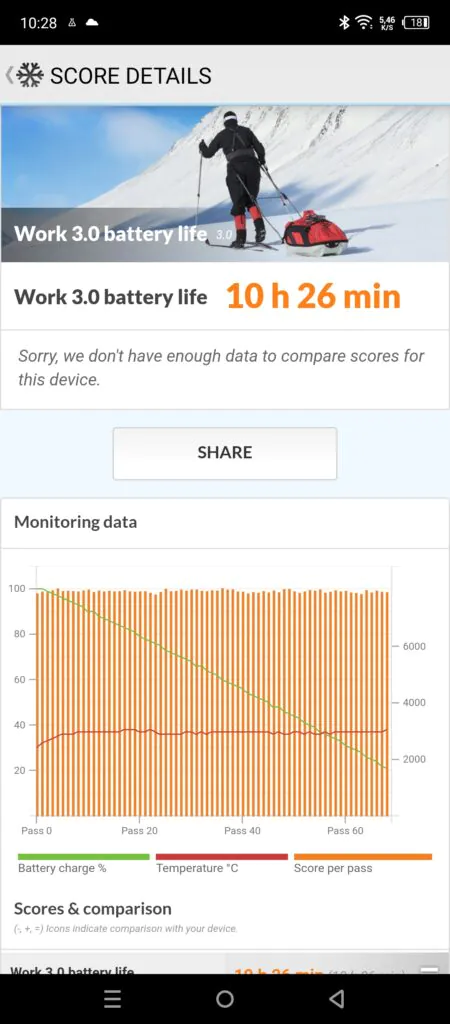
Conclusions
I liked the Infinix HOT 30. Cool original design and performance. Not bad technical characteristics, as for a budget model, not bad performance. High-quality display – colours, saturation, smoothness of the image. Interesting elongated format of the smartphone – at first uncomfortable, but then you get used to it and this format begins, on the contrary, like it. Pleasantly surprised by the camera and its application. I liked the shell XOS – for me it is like a native, did not have to get used to it at all. From the minuses I can highlight the low performance in demanding games, but given the price of HOT 30, I did not expect more from it and did not expect more. Verdict – I recommend it!
Read also:
- Xiaomi 13 Pro review: a flagship with a clumsy design and a high price tag
- OnePlus 11 5G review: budget flagship


